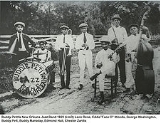
Edmond Hall
Encyclopedia
Edmond Hall was an American jazz clarinetist and bandleader. His father Edward Blainey Hall and mother Caroline Duhe had eight children, Priscilla (1893), Moretta (1895), Viola (1897), Robert (1899), Edmond (1901), Clarence (1903), Edward (1905) and Herbert (Herb
, 1907).
, Hall and his siblings were born into a very musical family. Not only did father Edward play the clarinet in the Onward Brass Band, but on his mother's side there were musicians as well, Jules Duhe played the trombone, Uncle Lawrence Duhe the clarinet and uncle Edmond the guitar. Robert, Edmond and Herbert would all become clarinetists, but before picking up the clarinet Edmond was taught guitar by his uncle Edmond Duhe. When Ed Hall finally picked up the clarinet, "He could play it within a week. He started Monday and played it Saturday." his brother Herb recalls in an interview with Manfred Selchow
who wrote the most outstanding Edmond Hall Biography (A Bio-Discographical Scrapbook on Edmond Hall), 640 pages, Profoundly Blue, which provided the material for all the information here.
Ed Hall worked as a farm-hand but by 1919 he was tired of it and left for New Orleans, despite his parents' worries of finding a decent job as a musician. The first New Orleans Band he ever played in was that of Bud Rousell (Bud Russell). He also played with Jack Carey (trombone) and blues cornetist Chris Kelley.
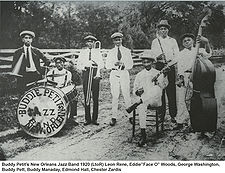 He then joined Lee Collins' band while being in Florida Pensacola. In 1923 he joined Mack Thomas' band, from there he went on to play with the "Pensacola Jazzers" where hall met the young trumpeter Charles Williams better known as Cootie Williams
He then joined Lee Collins' band while being in Florida Pensacola. In 1923 he joined Mack Thomas' band, from there he went on to play with the "Pensacola Jazzers" where hall met the young trumpeter Charles Williams better known as Cootie Williams
. From there he went to play with "Eagle Eye" Shields and left the band, together with Cootie Williams he joined Alonzo Ross' band the "Alonzo Ross DeLuxe Syncopators" in early 1927. In 1928 the band's pianist Arthur "Happy" Ford formed a new band and immediately hired Hall and Williams. Williams left at the end of 1928, which was somewhat sad to Hall, since he had taken the young musician under his wing.
. The next big step for Hall, since under the leadership of Hopkins the band became enormously popular and in 1930 they got an offer to play at the Savoy Ballroom "The World's finest Ballroom". In late 1935 Ed Hall left the Hopkins Band with whom he had been for exactly 6 years. He left because of personal problems he had with the band leader, while playing at the Cotton Club
.
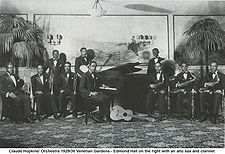 In 1936 he joined the Billy Hicks band, the "Sizzling Six". Hall who had been featured mainly on alto and baritone saxophone since 1922, finally had a place as a full-time clarinetist. Meanwhile his new sound on the clarinet had made a full circle and he began recording with the "big stars". On June 15, 1937 in New York, he had his first recording session with Billie Holiday
In 1936 he joined the Billy Hicks band, the "Sizzling Six". Hall who had been featured mainly on alto and baritone saxophone since 1922, finally had a place as a full-time clarinetist. Meanwhile his new sound on the clarinet had made a full circle and he began recording with the "big stars". On June 15, 1937 in New York, he had his first recording session with Billie Holiday
. Among the band members was Lester Young
on tenor saxophone.
Hall stayed with Hicks' band until early 1939, when no attractive jobs were in sight, he left and stepped into Café Society
, joining Joe Sullivan
's band in late 1937. While playing with Sullivan Hall had many recording dates with different bands and musicians in between the regular job at the Cafe Society with Sullivan.
Barney Josephson, the owner of Cafe Society Downtown and Cafe Society Uptown was very fond of Hall's playing and after Sullivan left to play solo piano at "Nick's", Hall became the "house clarinetist". Any band that would come in to play, had to get rid of their clarinetist, and take Hall or they would not get the job. Barney Josephson had made that clear.
In 1940 Henry "Red" Allen came to play at the Cafe Society and of course Hall was in the band. He spent 9 years at the Cafe Society, playing (also recording in between jobs) with many of the his contemporaries like Bud Freeman
, Teddy Wilson
, Charlie Christian
, Henry "Red" Allen, J.C. Higginbotham, Art Tatum
, Big Joe Turner
, Hot Lips Page, Zutty Singleton, Meade Lux Lewis
, Big Sid Catlett, Josh White
, Ida Cox
, Coleman Hawkins
, Helen Ward
, Vic Dickenson
, Sidney de Paris
, Wild Bill Davison
, Eddie Heywood
, Roy Eldridge
and Jack Teagarden
. Wednesday, February 5, 1941 was a special day in Hall's career, for the first time he was the nominal leader of a recording session.
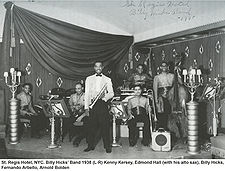
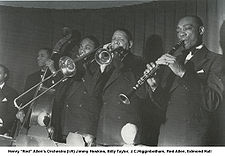
who also played at the Café Society. A dream came true for Ed Hall who had been wanting to play with Wilson's band for a long time. Hall was an excellent sight reader and due to many common performances it only took a few rehearsals and Ed was part of Wilson's sextet. Around this time Hall's style changed. His admiration for Benny Goodman
and Artie Shaw
, caused him to work on his technique, as he had always tried to improve technically. That's when he tried, to play the Boehm System
but soon went back to his beloved Albert System
, which he'd play until his death. Hall became one of the very few Jazz clarinetists who fully mastered the clarinet, with great clean technique at any tempo (unlike most of his contemporaries).
He had always sounded different than any of the other New Orleans clarinetists, but during the 1940s he had found and developed the unique sound that is his very own and instantly recognizable. Nobody had ever sounded like him before and nobody has ever sounded like him since. With Wilson he was still very much swing-oriented, which would change by the end of the 1940s and peak with the Louis Armstrong All Stars in the mid-1950s.
Many records under his name as band leader appeared during this period as Edmond Hall's Blue Note Jazzmen, Edmond Hall Sextet, The Edmond Hall Celeste Quartet, Edmond Hall's Star Quintet, Ed Hall and the Big City Jazzmen and Edmond Hall's Swingtet. The recording sessions always took place in between the work hours of the Café Society, including many of the musicians who performed there as well.
Hall had become very popular among the musicians and critics likewise and was frequently invited to the New York Town Hall
Concerts led by Eddie Condon
.
Hall and the other Wilson band members were left at the Café Society, not wanting to give up their spot. Hall then was asked by Barney Josephson to front a band of his own. Ed Hall was 43 at the time and had been in the music business for over 25 years, when he finally got his chance.
Again critics praise Hall's playing with his own sextet at the Café Society in July 1944. More recording dates followed for the famous Commodore Records
and Blue Note
labels.
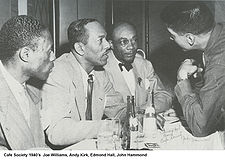
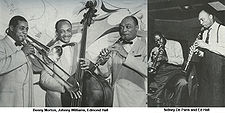
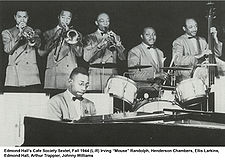 While business at the Café Society was exceedingly good, Hall appeared at the Town Hall Concerts in between. Hall "moved" his band to the Café Society Uptown, where he received just as much praise as he did at the Café Society Downtown. The Hall band would also play for the service men of world war ll. Those live broadcasts, unfortunately have not yet been released on record.
While business at the Café Society was exceedingly good, Hall appeared at the Town Hall Concerts in between. Hall "moved" his band to the Café Society Uptown, where he received just as much praise as he did at the Café Society Downtown. The Hall band would also play for the service men of world war ll. Those live broadcasts, unfortunately have not yet been released on record.
By the end of April 1945 things changed at the Uptown Café Society, causing Hall to leave with his band - the reasons for that remain unclear.
However, Hall and his men were back at the Uptown Café just 2 months later. Hall was placed second in the 1945 Esquire
magazine poll in the best clarinet player category, right behind his most admired clarinetist Benny Goodman
.
Still at the Uptown Café Society in 1946 Hall and his band would appear at the WHN Gloom Dodger radio show, two days a week, for a longer period of time.
's appearance at the famous New York Carnegie Hall
was announced. Edmond Hall and his small combo were picked to accompany Armstrong during half of the program, which was to showcase Armstrong's musical career. The other half featured Armstrong and his big band.
Armstrong's own band at the time did not gain any positive reviews and the experience of playing with Hall and his small combo, caused Armstrong to abandon his big orchestra, and to form a small group of his own in spring of 1947, The All Stars.
In the mid-1940s "Bop" had started to 'drive away' New Orleans Jazz, and this caused Barney Josephson to bring in new people, after closing the club over the summer. In June 1947 Hall left Café Society, his band members joining other bands, forcing Hall to find another job.
In September 1947 he joined the "All Star Stompers" with Wild Bill Davison, Ralph Sutton
and Baby Dodds
. Meanwhile business at the old Café Society was bad and Barney Josephson again called upon Edmond Hall to come back. Hall did so, with a new band of his own despite the efforts business at the Uptown Café Society worsened and Barney Josephson closed Uptown for good in December 1947.
Besides the Carnegie Hall recording with Armstrong those (studio recordings) from September–December 1947 (mainly with Punch Miller
and his band) were Hall's last until 1950. After Uptown was closed Hall took his men back to Downtown Café Society, however in June 1948 Hall's band was replaced with the Dave Martin Trio.
After the 9 year reign at the Cafe Society Ed Hall laid off for a while, looking for a new job. In the fall of 1948 Hall took a job at Boston's Savoy Cafe, playing with the members of Bob Wilber
's band who had gone to tour Europe. During this time Hall also accepted jobs outside of Boston and together with pianist George Wein
promoted a concert they held on a day off. In retrospect Steve Connolly of the Savoy Cafe asked Hall to bring his own band and succeed Bob Wilber.
Hall's band, the "Edmond Hall All Stars" began playing the Savoy on April 4, 1949. The band was hailed as "The best band Boston ever had".
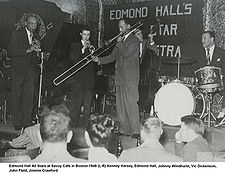 Hall left the Savoy in early March 1950, to get back to New York. Playing clubs and festivals, with one job up in San Francisco as well.
Hall left the Savoy in early March 1950, to get back to New York. Playing clubs and festivals, with one job up in San Francisco as well.
Things changed again, when on August 3, 1950 Eddie Condon
called Hall in San Francisco, asking him to join his band at the Condon Club. Edmond Hall accepted without hesitation.
Hall stayed with Condon, off and on playing other jobs as well, joined by mostly other members from Condon's band. An example was the "Annual Steamboat Ball" in June 1951. Or the frequent sessions for the "Dr.-Jazz" broadcasts during 1952. Condon's band were not only a hit at the club but recorded many fine sessions, during Hall's engagement with the band.
In November 1952 Hall participated in a special concert "Hot Versus Cool" a showdown between the "old" (New Orleans Jazz) and "new" (Bebop) music. The New Orleans musicians were: Jimmy McPartland
, Vic Dickenson
, Hall, Dick Cary
, Jack Lesberg
and George Wettling
. On the opposite side there was Dizzy Gillespie
, Max Roach
, Al McKibbon
, Ray Abrams
, Don Elliott
- The record received a top rating of 5 stars in Down Beat
. During 1954 Hall would record with many other musucians like Vic Dickenson
, Ralph Sutton
, Mel Powell
, Jack Teagarden
and Jimmy McPartland
, to produce more exceptional music for labels like Storyville
, Decca
and Columbia
.
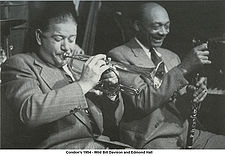
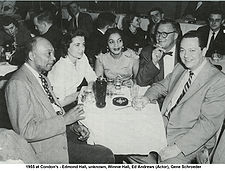
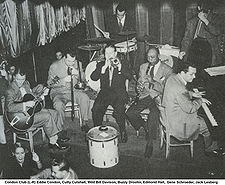
. Joining Armstrong would prove to be one of the highlights in Hall's career.
The Band left October 1955 for Europe, starting their 3 month tour in Sweden.
For Armstrong and his All Stars it was a complete triumph. Hall's playing was essential to that success, the European audiences reacted euphoric to his playing.
Hall enjoyed playing with Armstrong again as much as he enjoyed the trip and the audience's reaction. There seemed to be a vast improvement, a lifting for the whole band when Ed Hall come on deck. His modern way of playing and unique style not known to clarinet-players at the time, completed the All Stars and Armstrong's powerful melodies. Which he always played with tremendous authority and punch. Edmond Hall's clarinet playing had all those characteristics as well.
Hall exited the audiences and got great reviews from the critics regarding his playing at the side of Louis Armstrong.
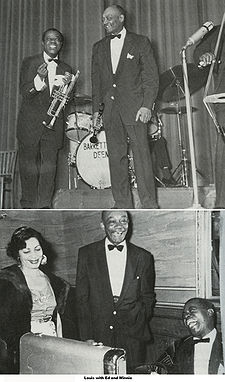
 The Band sold out every show in every country during their 3 months Europe tour, giving an extra matinee in Stockholm, Sweden in order to accommodate fans who could not get in to see the first show. Some of the other towns could have supported an extra performance as well but the band's tight schedule did not permit such activity.
The Band sold out every show in every country during their 3 months Europe tour, giving an extra matinee in Stockholm, Sweden in order to accommodate fans who could not get in to see the first show. Some of the other towns could have supported an extra performance as well but the band's tight schedule did not permit such activity.
Back in the US the band's terrific success was praised, as Felix Blair of the New York Times wrote: "America's secret weapon is a blue note in a minor key. Right now its most effective ambassador is Louis Satchmo Armstrong."
Creating the title for a milestone in music history, the "Ambassador Satch" album, which was released under Columbia.
February 1956 the combo made Los Angeles, California their home, to shoot the motion picture High Society starring Grace Kelly
and Bing Cosby.
The entire band had a blast during that time.


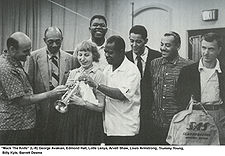 After a few concerts in the US the band had another engagement in Australia which again was a tremendous success, just like the Europe-tour almost a year before.
After a few concerts in the US the band had another engagement in Australia which again was a tremendous success, just like the Europe-tour almost a year before.
Again it was Edmond Hall's outstanding musicianship that deeply impressed the Australian fans and was singled out for praise. The "Quarterly Rag", Vol.1, #4 July 1956 devoted an extended article to Hall.
Another article from "Music Maker" (Sidney) May 1956 has this to say:
"... as a soloist Hall was outstanding, he brought the house down with his slow, quiet "You Made Me Love You" and the encore "Sweet Georgia Brown" had the crowd yelling for more."
The next concert overseas in Great Britain (May 1956) did not do as well, due to terrible acoustics in the huge Empress Hall. However as before Hall was praised again in 3 articles (The Observer, Manchester Guardian and Jazz Journal) of his exceptional playing and named the only one who came through despite the terrible acoustics.
Directly from England The All Stars flew straight to Ghana, Africa for a first appearance. It became the most unbelievable experience in the careers of each band member.
They were greeted at the airport by 13 bands, welcoming them with ALL FOR YOU, LOUIS (on Columbia CL 1077).
Playing before 5000 people crowds in Europe before, this was the largest crowd Armstrong and his men had played for. 110000 people awaited them for their first concert! Everywhere they went the crowd followed and treated them like royalty.
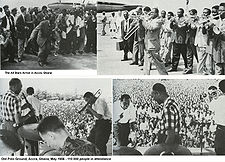 Back n the US they toured from city to city off and on playing for Fundraisers as well, keeping an extremely tight schedule.
Back n the US they toured from city to city off and on playing for Fundraisers as well, keeping an extremely tight schedule.
June 1956 The All Stars opened at Basin Street East in New York with again great success. However critics began to accuse Armstrong of playing the same tunes over and over, which was certainly true, as was the one that most of the All Stars tended to repeat their solos note by note at every concert - with Edmond Hall ALWAYS explicitly excluded from this accusation in any of those write ups.
July 14, 1956 was yet another milestone in music and the band's career. When playing with the New York Philharmonic
under Leonard Bernstein
. The evenings grand finale was Bernstein conducting the stadium symphony orchestra in a Alfredo Antonini
arrangement of "Saint Louis Blues" a nearly 12 minute rendition, changing between the All Stars and the orchestra, with a spectacular solo by Hall. The event was held at Lewisohn Stadium
in New York, which drew a crowd of 21000 people!
 In addition the event was partially filmed, adding to a documentary which was produced and narrated by Edward R. Murrow
In addition the event was partially filmed, adding to a documentary which was produced and narrated by Edward R. Murrow
called "SATCHMO THE GREAT"
It contains many clips of the All Stars with Edmond Hall, while in Europe and Ghana. Unfortunately so far it has not been released on DVD, which is inexplicable. The soundtrack to the film exists on CD and is absolutely outstanding, including Hall's great solo on Saint Louis Blues with the Bernstein Symphony Orchestra. After the concert Louis was deeply touched by the audience's reaction and Bernstein's laudatory speech. (also audible on the CD).
The next day The All Stars appeared on The Ed Sullivan Show
, before leaving for the midwest to play the Ravina Festival at Highland Park. Again a huge success, with a crowd of 136816 people in attendance, which was yet another record.
The next concert was on August 1956, joining other famous musicians to play the Norman Granz Benefit at Hollywood Bowl
. The concert again was a giant success with a box office high of $32000!
More tight scheduled concerts and one-nighters throughout the US followed.
December 8, 1956 The All Stars entered Decca
studios to record the album "Satchmo - A MUSICAL AUTOBIOGRAPHY". Again Hall is outstanding on the entire set, with a version of the classic "High Society" - (no link to the movie or the songs played in the movie), an old classic that in the old days would determine the capability of a clarinettist - Halls version here is among the very best ever recorded.
February 6, 1957 The All Stars kicked off another grueling tour with 60 stops throughout the US. While playing at a concert in Knoxville Tennessee ( February 26, 1957) someone threw a stick of dynamite over a fence which exploded a few hundred yards away from the municipal building where the band played. The sound of the blast still echoing Armstrong calmed the crowd by saying: "That's all right folks, it's just the phone." Nobody in the mixed audience got excited and the show went on.
Louis Armstrong's routine program gave each of his men permission to do one feature number. Ed Hall usually soloed on High Society, Clarinet Marmalade, You Made Me Love You, Dardanella or Sweet Georgia Brown. Sometimes Louis allowed a second number after Hall had the audiences on their feet!
October 27, 1957 The All Stars took off for South America, where they again were greeted by a huge crowd of fans at the airport. There as well Hall was soon a favorite of the fans and was invited to a recording session with a local band (record unfortunately never was released in the US) and became an honorary member of the "Hot Club De Buenos Aires."
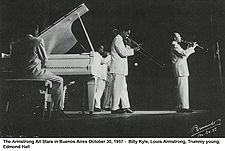 The Argentine tour was again a huge success breaking all records for theatre grosses and fans who could not get enough of the band. The band were also scheduled to play in Chile, Uruguay to Brazil and Venezuela. The South America trip yet another triumph for the All Stars.
The Argentine tour was again a huge success breaking all records for theatre grosses and fans who could not get enough of the band. The band were also scheduled to play in Chile, Uruguay to Brazil and Venezuela. The South America trip yet another triumph for the All Stars.
More touring, one-nighters and another highlight the invitation to play at the Boston State house, where Armstrong was officially named the "Ambassador of good will."
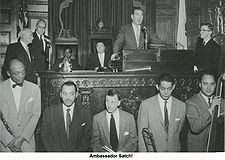
Although Edmond Hall made some excellent recordings during the 1940s with Teddy Wilson, early 1950s with Eddie Condon, Vic Dickenson and Jack Teagarden, his recordings with Louis Armstrong's All Stars, most likely fueled by Armstrong's playing, are the most powerful clarinet solos ever recorded. His phrasing, technique and "punch" were at its best while with Armstrong.
Hall expressed that he had no problem with or disliked Satchmo in any way, more so, Hall found him to be a real character to work for. It was merely the musical aspect, where he found Armstrong to be "stagnant", playing the same concert night after night, no matter if it was a dance, a night club, a concert hall. It was always the same. "A guy's got to do something new once in a while to develop." Hall adds: "We made records with the All Stars, but we wouldn't even play them! Just night after night the same concert, until I couldn't take it anymore. That isn't jazz."
As mentioned before the second reason was the grueling schedule and traveling around the world and back and forth in the US. Hall recalls: "I was with him exactly 3 years and Louis wouldn't take a vacation the whole time. That just got too much for me. He was afraid to stop playing for 4 or 5 nights, for fear he'd go bad, that his lips would give out. This was all mental of course."
His view might have also been supported by the critics write-ups, especially within the last year, who would often single out Hall, emphasizing his outstanding playing with the All Stars.
After Hall had left Armstrong he and his wife Winnie flew to California for a long vacation. Hall himself was not aware of the positive influence of Armstrong on his on musical development. As he used to be much more a swing oriented player he had become pure jazz, which enabled him to draw out the most of his clarinet. Yet during his vacation he practiced a lot, "trying to get Louis out of his system." The 3 years with Armstrong had given him the most successful, musically and financially years of his life. He also had become part of a famous motion picture as well as part of a filmed documentary on Jazz. Further he had had the opportunity to travel the world, Europe, Great Britain as well as South America and Africa - which was the bands greatest success.
But the monotony of the repertoire in the last year as well as the grueling schedules had taken a toll on Hall.
After his vacation he met up with old friends like Ralph Sutton and Teddy Wilson, with whom he played August or September 1958 at the "Embers" in New York, "freeing" his mind of the Armstrong repertoire from the last year.
He also would play with Condon again.
More engagements followed with old friends like Henry "Red" Allen, and J.C. Higginbotham. Still highly regarded Hall was asked to play in Canada as guest star, to play with two local bands, in Cairo and Toronto. The reviews of the concerts were full of praise calling Hall one of the Giants of Jazz.
Back in Chicago he'd play a six week engagement at the "JAZZ Ltd." Announced as "The Great and Incomparable Louis Armstrong Clarinetist."
Which shows the status and impact Armstrong had in the music industry.
After Chicago, in December 1958 Hall went back to the recording studio and recorded "Petit Fleur" under his own Sextet, including old friends from the cafe society as well as trombonist Vic Dickenson. The record was no commercial hit, since then only Rock & Roll and modern Jazz records made really big money.
"Petit Fleur" is a perfect example, showing the difference in what Hall was with the All Stars and what he was without them. However Hall was especially pleased about the nice reception of his own compositions on the album.
More recordings followed one album even with strings (all songs written by Hall) which was "nice" but not that outstanding.
On March 7, 1959, Ed and his wife Winnie left New York for an "exploratory trip".
March 27, 1959, the Halls flew back to the US. Fueled by enthusiastic letters from youngsters who heard about Hall's plan to open a music school in their country, the kind and friendly reception the Halls got and the fact that "One could walk in dignity" over there since there was no racial discrimination, set their plans to settle there for good, coming autumn.
Back in the US, Hall was invited to participate at the "South Sore Jazz Festival" in Milton, Massachusetts. He would play all the annual festivals until his death.
June 25 and 26 1959, Ed Hall went back to the recording studio, with most songs written by Ed Hall. The record's title "Rumpus an Rampart Street" under Edmond Hall and his orchestra.
 October 1959 the Halls depart for Ghana, causing lots of articles in the press. (US and Ghana papers).
October 1959 the Halls depart for Ghana, causing lots of articles in the press. (US and Ghana papers).
But what started so enthusiastically ended up in sheer disappointment and on December 17, 1959 the Halls arrived in England to spend the holidays with friends.
Hall's hopes to bring back what originally came from there (Africa), bring back the rhythm in an "educated" form and teach the youngsters, who were overly enthusiastic of learning his technique on clarinet.
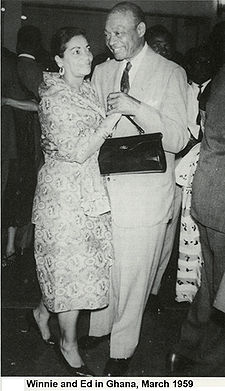 Sadly Edmond Hall's dreams were crushed in just three months. Hall found out that not only did not the once so enthusiastic youngsters practice on a regular basis but gradually stopped coming to the lessons. Hall even had bought clarinets for some of them. Building a solid band also proved impossible:
Sadly Edmond Hall's dreams were crushed in just three months. Hall found out that not only did not the once so enthusiastic youngsters practice on a regular basis but gradually stopped coming to the lessons. Hall even had bought clarinets for some of them. Building a solid band also proved impossible:
"They wouldn't take it up full-time and I couldn't get them to rehearse. They didn't think there was a future music. It was my intention, to get a band going in order to make a living, then open a studio and start the young ones of on a jazz footing. There is little knowledge of harmony and not much desire to learn. My idea had been to start off with one drummer then add two more, get some stuff going, adding some kind of jazz melody. I hoped to record with this group and if the band was successful, get them around the world a bit. But they don't do things we do - everything is Yes, but when the day comes..."
The Duke of Edinburgh, who had arrived in Ghana for an inspection of the Ghana broadcasting system, attended a jam session, led by Ed Hall, was afterwards introduced and shook hands with Hall. This was the only highlight of Ed Hall's second trip to Ghana.
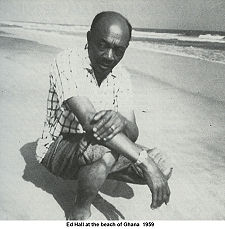 On December 27, 1959 the Halls flew back to New York. The only thing left in New York was their apartment, which they had not given up; however they had to buy everything new and reorganize. The emigration to Ghana had cost Hall the participation in a big tour of Germany, that he was supposed to have made with Humphrey Lyttelton in January 1960.
On December 27, 1959 the Halls flew back to New York. The only thing left in New York was their apartment, which they had not given up; however they had to buy everything new and reorganize. The emigration to Ghana had cost Hall the participation in a big tour of Germany, that he was supposed to have made with Humphrey Lyttelton in January 1960.
Playing weekend jobs and occasionally at Condon's, Hall went back to Toronto, Canada on February 15–20, 1960. Again getting exceptional reviews from critics after the concerts.
The 2nd "Annual South Shore Jazz Festival" was on April 7, 1960.
Hall again was invited and the head-liner of the show.
Ed Hall gets an invitation from the Czech government, to be featured as a guest star in Gustav Brom
's band, to tour Hungary and Czechoslovakia.
May 28, 1960 the Halls arrive in Prague. The three-month engagement was an incredible success, with audiences of up to 15000 people. With thousands of people wanting to see and hear Ed Hall, rushing backstage, demanding autographs. Even at the hotels they stayed they were overwhelmed with flowers, gifts, asked for photographs and autographs. During this time Hall became a good friend of Gustav Brom and his musicians as well. He was not only satisfied but happy, his spirits high again and the "wounds" of Ghana healed.
Back in the US Hall laid off for a while but never declined to play at "Central Plaza", when invited, because there were always great musicians, which Hall had known for many years. This time he met Chris Barber
, trombonist from England. A few days later Barber fulfilled his dream and invited Hall to play and record a session with him and his band on November 7–8, 1960.
On March 15, 1961 Edmond Hall arrives in Stuttgart
for a radio broadcast - recording session.
On March 16/17 1961 Hall went back to Denmark, playing with a group of young musicians, the "Cardinals" and other bands until his return to the US in early April.
 After assembling a new band the "Hall-American-Jazz-Stars" he opened at the new "Condon's" in New York, where many prominent musicians and movie actors came into the club to listen to Hall. Originally the engagement was for 4 weeks but due the band's success it went well into the summer of 1961.
After assembling a new band the "Hall-American-Jazz-Stars" he opened at the new "Condon's" in New York, where many prominent musicians and movie actors came into the club to listen to Hall. Originally the engagement was for 4 weeks but due the band's success it went well into the summer of 1961.
Hall was supposed to join Papa Bue's Band to tour Germany, he even had signed the contract and despite knowing about his popularity in Germany, Hall ended up touring with Yves Montand
through Canada and the US. Most likely that Montand offered Hall a salary he simply could not refuse. The tour lasted 5 months.
During the tour Hall had time to participate in another recording session (February 1962), joining Leonard Gaskin
's All Stars.
After the tour he went back to record yet another session with the Marlowe Morris Quintet, before picking up at Condon's again.
April 1961 Hall plays at the 'Fourth Annual Milton Jazz Concert" together with Doc Cheatham. Once again Hall was being singled out for praise in reviews.
Still at Condon's he left to play in Toronto again, while clarinetist Buddy DeFranco
was in town as well. The concerts' reviews left Hall singled out as the "victor" once again. "He (Edmond Hall) will be 61 years old in two weeks and he is the most dynamic performer in Jazz today." - P. Scott in Globe and Mail 05/05/1962.
Back at Condon's Hall was invited to another recording session with "The Dukes of Dixiland".
November 1962 Hall was back again in Europe to tour with Chris Barber, recording and touring England, Germany and Switzerland.
The band would play to over 13000 people at their first 3 concerts in Germany where the tour started.
Back home again Hall accepted occasional jobs, off and on showing up at Condon's. He assembled the Edmond Hall Quartet which opened up at Eddie Condon's on February 18, 1963. The engagement lasted until October 1963.
The job at Condon's was only interrupted by short breaks for out of town jobs, featuring Hall as guest star at festivals as well as a few benefit concerts.
The Hall band continued working well into 1964.
April 26, 1963 the 5th "Annual Milton Jazz Concert" had Edmond Hall, his friend Vic Dickenson and Bobby Hackett
as front-liners.
September 14 & 15, 1963 Hall was invited to play at "Dick Gibson's Colorado Jazz Party" since Hall was Gibson's favorite clarinet player Hall was invited to all the following annual parties.
Then Hall and his quartet played at "Conolly's Star Dust Room" in Roxbury Massachusetts throughout September 1963.
Hall also appeared on some Jam sessions during that time as well as at session in Natick at Paul Meymaris home, who was a good friend of Hall and also his dentist.
By 1964 Edmond Hall and his wife had settled from New York to Cambridge Massachusetts for good. The face of music had changed dramatically and the request for old-time Jazz had diminished drastically.
The lack of jobs in the US made Hall think of another tour to Europe, contacting Gustav Brom whom which he played with in Czechoslovakia, having had a very successful tour in 1960.
Hall appeared, again with friend trombonist Vic Dickenson and Buck Clayton
at "Dick Schmidt's Sixth Annual South Shore Jazz Concert".
In July 1964 Hall was invited to play the "Newport Jazz Festival", for the opening night's "GREAT MOMENTS IN JAZZ", which featured a complete star line-up, with many of Hall's friends.
The festival was a financial and musical success.
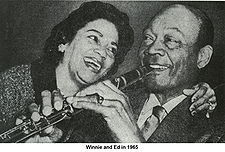 George Wein put together a package of different bands, Hall as featured star with the Dukes of Dixiland (Barrett Deems
George Wein put together a package of different bands, Hall as featured star with the Dukes of Dixiland (Barrett Deems
on drums) and started touring Japan from July 10–16, 1964. Again Hall was given praise to by critics as having been the hit of the show. (Leonard Feather in New Yorker Post, 08/02/1964)
Back in New York, Ed Hall joins Jimmy McPartland
's band for a few weeks, to play at "The Strollers".
July 1964 Hall played at Carnegie Hall for "Salute to Eddie Condon".
The concert drew over 1000 people and was hailed a success.
A "reconstruction session" of the concert was held and televised on March 27, 1965. Hall continued to appear at Jazz festivals (often with friend Vic Dickenson), so he did at the second "Dick Gibson Colorado Jazz Party", again with great success and good companionship.
A true friend of the Halls surgeon Dr. O. A. Fulcher was at the party as well and got his friends a follow-up job of 4 weeks in Odessa, Texas, sparking what would become the "Odessa Jazz Party". There Hall played with old friend Ralph Sutton
who got another job at his wife's restaurant which had just been opened. The job lasted all winter, into March.
The Seventh Annual South Shore Jazz Festival in Milton was on April 24, 1965, Featuring Hall and Wild Bill Davison who had been playing together many times (especially at Condon's in the early 1950s).
Hall played more of the recurring festivals as well as another concert in Toronto, Canada, which lasted from November 22 - December 19, 1965. The concert review was beyond praise for Hall. Calling the 64 year old "The world's greatest Jazz Clarinetist ever - the only super-star left in the field of Jazz".
Winter 1965/66 Hall played the Monticello restaurant, which lasted 3–4 months. with some one-nighters in between. The job at the restaurant was proof of the diminishing popularity of Jazz, as Hall often played in front of a little to no audience and little to no-one really listening or appreciating the talent of a world famous jazz-man.
As the jobs got rarer Edmond Hall would even have played for little as $50 just to play. but his wife Winnie did not let him unless the offer was at least $70–$75.
By then Hall was semi retired and would show up unexpectedly at a nearby pub called "Bovi's Tavern", where a local band Tomasso & his Jewels of Dixiland would play, to join them. According to Tomasso they never knew when Hall would show up and Hall did that for a period of about six months, without any contract and for free, just to play and get his "kicks" out of it.
April 29, 1966 was the "Eight Annual South Shore Jazz Concert" with Hall and Doc Cheatham as the stars.
June 1966 he played at the "Dummer Academy" as well as at a concert at Princeton University, which was partially recorded. Some smaller jobs followed, until the next "Annual Newport Jazz Festival" at the "Lewisohn Stadium", which was in September 1966, followed by another "Gibson's Party" at the "Annual Jazz Festival" in Aspen, Colorado. Again featuring many greats like Hall, Teddy Wilson, Bud Freeman
, Cutty Cutshall
a.o.
A big Break came on November 1966, when plans for a Europe tour were made. Hall was to play with Alan Elsdon
's band during the tour, which started in England on November 2. 1966. November 21, 1966 Hall flew to Hamburg to meet up with the guys from Papa Bue's Viking Jazzband, of which he would be part of during the next stage of the tour, through Germany, Denmark and Sweden. After touring Sweden Hall went back to Denmark to record for the label Storyville at the Rosenberg Studo in Copenhagen. These recordings showing the 65 year old Hall still in excellent control of his instrument, besides the great sound quality.
These recordings would be the last studio recordings of Edmond Hall.
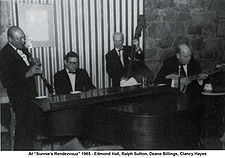
On January 1967 there was another important engagement the "John Hammonds 30th Anniversary Concert - Spirituals to Swing" at the grand Carnegie Hall in New York. Hall was invited as he belonged to a group called the "Cafe Society Band", which was featured at the concert.
The next important concert was the "Second Annual Boston Globe Jazz Festival" on January 21, 1967.
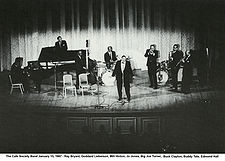 February 3. 1967 Hall played at the "Governor Dummer Academy" with George Poor's band, together with Bobby Hackett as the featured stars.
February 3. 1967 Hall played at the "Governor Dummer Academy" with George Poor's band, together with Bobby Hackett as the featured stars.
The concert was as always a success and luckily it was recorded and is available on CD as "Edmond Hall's last Concert". On that record Hall plays as if his life had just started, with great power - listening to it is amazing since he plays much better and more powerful than on many records he made after the days with Louis Armstrong (including the record Petit Fleur!) His technique is very clean and there is no sign of him slowing down, yet on February, Wednesday 12, 1967 at 11 A.M.
Edmond Hall died. He had shoveled snow from the side-walk in front of his house, then he got in his car to go somewhere. While driving he realized something happened to him and steered the car to the curb. Edmond Hall died in his car of a heart attack, he was 65.
.jpg) The music world and friends were in shock after the untimely passing of Hall, his wife Winnie remembers: "Edmond never had been ill, as long as I knew him, but in the last years, when jobs became rarer, he became seriously doubtful about himself and his artistry. Edmond just wanted to play - kept saying "All I want is a job". You know, Edmond died of a broken heart!"
The music world and friends were in shock after the untimely passing of Hall, his wife Winnie remembers: "Edmond never had been ill, as long as I knew him, but in the last years, when jobs became rarer, he became seriously doubtful about himself and his artistry. Edmond just wanted to play - kept saying "All I want is a job". You know, Edmond died of a broken heart!"
Medically nobody certainly can die of a "broken heart", but grief definitely can "break a heart" and kill a man. Edmond Hall was too proud to tell the world how much he needed it - his music, the appreciation of his colleagues, the big applause of the excited audience, and the acknowledgment of the critics - all that counted much more than money. Ed Hall was what he played, the gentle, mild mannered man with the fiery, powerful and distinct melodies and syncopation that came out of his Albert Clarinet, in his very own way, instantly recognizable, which set him apart from any other clarinetist.
On May 12, 1938 he married his beloved (second) wife Winnie. Winnifred Henry came out of Cambridge Massachusetts. Ed first met her while playing with the Hopkins Band 3 years earlier, at the Ruggles Hall in Boston.
They had no children.
Ed Hall was constantly practicing his clarinet even on his days off.
Winnie would sometimes be part of his travels (especially overseas). They had friends in England whom they visited frequently
Throughout his career into the mid 1950s Hall was confronted with race discrimination, like so many. Some accounts are recorded where even the mild mannered Hall could not keep quiet - one in 1951 while playing at Condon's when a film crew came in and wanted Hall to play the background track but be replaced with Pee Wee Russell for the actual shooting. Hall refused and called his union. Condon and the other musicians supported him in the end they made two versions one the company had suggested and one as it should have been with Hall. The reason was because the film company would lose a large audience in the south, if displaying a black man in the band. In the end the CORRECT version with Hall was the only one released.
Hall also recalled frequently being talked to by police about the way he parked his car, whereas other guys in the group got away with it.
On a trip up the coast from New York to San Francisco in his Jaguar, Winnie accompanying him, there was one night were they could not "find" a hotel and had to spend the night in their car.
In 1952 Hall, Buzzy Drootin and Ralph Sutton appeared as the Ralph Sutton Trio in Saint Louis, where they played the "Encore Lounge" for several weeks. They were the first mixed trio there. One day they went over to a restaurant which was next door, whose owner would come over frequently and listen to the Trio play. They got to know him as they also frequently spoke. They walked in everybody said hello and they were seated by the waitress. After waiting for 10–15 minutes she came back, apologizing that the kitchen was closed. They knew immediately what was going on, the point however was, that the owner was their friend, who knew Edmond and the others, he even liked them, but he was afraid to stand up, afraid of what the other customers would say. Ed Hall got out immediately...
Ed Hall was known as a polite, gentle, reserved, modest man. Some describe him as kind, never judging any of the performances of his contemporaries. Hall composed around 38 songs from which his most successful came in the 1940s while playing at the Society Cafe. Yet his best solo playing was undoubtedly with the Louis Armstrong All Stars. Next to Armstrong Hall made what they had become, as many critics' articles emphasize. The All Stars would musically never be quite the same after Hall had left.
The Halls lived a "simple" life but Edmond and his wife Winnie, both had a passion for expensive and fast cars, which was the only luxury they would afford.

- Hall's favorite drummer was Sidney (BIG SID) Catlett.
- Hall rated Buddy Petit's playing higher than Armstrong's, of course Petit was the first big break for Hall and Petit failed (despite several offers) to make a recording, so we will not ever really know.
- Amongst fellow musicians Hall was rated to be the best dressed
- Hall did not drink alcohol at all, when playing at the "Storyville" the menu had different names for the beverages, referring to the different greats who played there: "Jelly Roll's Request" was a mix of imported rum, apple jack, simple syrup, "Louis Laugh" was cream, coffee, brandy, "Kid Ory's Kick" was brandy, curacao, anisette, "Edmond's Favorite" was lemonade (to name a few) - this was of course referring to Hall's drinking attitude.
- Hall loved expensive and fast cars, the only luxury in his live - he owned a Jaguar XK 120, a 1953 Jaguar Mark Vll, and a Mercedes 170
- Hall's other passion was shooting pool, although he was not good at it, he could not wait until the end of a set, to shoot pool.
- Ed Hall would go on frequent walks "to get his exercise"
- 1957 Hall and the Armstrong All Stars played at the United States Penitentiary of Lewisburg, Pennsylvania. The band's fee was a free meal. The All Stars were the first band to provide free music for the inmates of a correctional institution. Other Artists would follow their example (Connie Francis, Count Basie, Mills Brothers, etc.)
- During the film work on High Society, Hall's dentist had to come by and take care of two worn off crowns on two of Hall's front upper teeth.
- During the engagement in Czechoslovakia (1960) all the hotels were full and the musicians received lodging at an obscure hotel. However the office for foreigners offered Hall (as guest of our country) an apartment in an exclusive international hotel. Hall did not accept the offer and said: "I remain to live with my colleagues. What's good for them is also good for me." This shows part of Hall's character!
- 1945 Hall wins Esquire Magazine Silver Award for clarinet, right after his most admired clarinetist Benny Goodman
- 1961 Hall received a certificate for nomination as one of the outstanding jazz artists of 1961 from Playboy Magazine
- 1961 Hall was awarded as the best Clarinetist by the "English Melody Maker"
"As a soloist, Hall was outstanding. He brought the house down with his slow quiet "YOU MADE ME LOVE YOU" and the encore "SWEET GEORGIA BROWN" had the crowd yelling for more." - Music Maker (Sidney) May 1956 (wit Armstrong All Stars)
"Outstanding among the band members were pianist Billy Kyle and Clarinetist Edmond Hall. Hall a highly rated performer in the U.S., got through with his message with apparent ease, and rightly deserved his share of the applause."
- Music Maker (Brisbaine) May 1956 (wit Armstrong All Stars)
"In the more musical portions of the program, which happens to be the segments devoted to jazz, the expected also occurred. Clarinetist Edmond Hall once more showed, with every note he blew, the best musicianship of any performer on stage."
- The Globe & Mail (Toronto) 02/25/1958 (wit Armstrong All Stars)
"The show wasn't all Satchmo, clarinetist Edmond Hall, who nearly stole the whole shebang with skirling renditions of "SWEET GEORGIA BROWN" and "YOU MADE ME LOVE YOU." The Hartford Courant 04/26/58 (wit Armstrong All Stars)
"Edmond Hall's return visit to Basin Street was an outstanding success. Playing with even more verve and excitement, This was the best clarinet we remember him play. Featuring numbers from his new album the fresh material made a pleasant change and Edmond Hall must be one of the hardest swinging musicians playing today." Coda March 1960
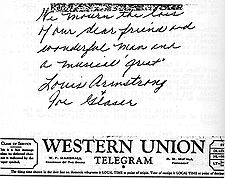 "He is a boy from my hometown, you know, and we have known each other for years.
"He is a boy from my hometown, you know, and we have known each other for years.
Been the best of friends and, you know, he is a fine clarinet man and I just want you to know that I am all for him. Edmond played with us so many years, may the Lord bless him, you know."
LOUIS ARMSTRONG - Trumpet
"Edmond Hall Influenced a lot of clarinet players by his unique sound. Many people copied or tried to copy his sound, which is a great compliment. I met Edmond and his wife at a party Atco (records) gave me in their studio. They were a charming couple. Ed was a gentleman all around - and we got along very well."
ACKER BILK - Clarinet
"Edmond Hall was a great clarinetist and a fine old southern style gentleman.
I really enjoyed touring with him."
CHRIS BARBER - Trombone
"Edmond Hall was an unbelievable player. I used to watch him, but I never heard him make a mistake. He was just a perfectionist. And he was wonderful, big hearted and a kind person and very, very much a gentleman. I remember once, I was building a house and I was talking to the guys in the band. about I had run out of money. And I said: "I have to go down more feet and I need more money!" And Edmond said: "How Much?" And he gave it to me. Condon's was the highlight of my life. At Condon's it was New Years every night. And it was a real pleasure to work there and to play with those guys. There was never a bad musician in that group. And Edmond Hall to me remains the best clarinet player I have ever heard."
WILD BILL DAVISON - Cornet
"Ed Hall - YEAH! He was a great cat and a fine musician. Edmond and Trummy were the nicest guys. Ed is my man and I truly miss him."
BARRETT DEEMS - Drums
"I never realized how great Edmond Hall really was until I got to work with him. Edmond was a giant on the clarinet. He was just a very nice and gentle man, never wanted trouble with people, never was really angry. I had a wonderful relationship with him."
BUZZY DROOTIN - Drums
"His clarinet sounded like a human voice. What Louis Armstrong was for the trumpet was Edmond Hall on the clarinet. Could talk on his instrument."
EDDIE DURHAM - Trombone
"I have to say I have played with many USA musicians visiting the UK, and Edmond Hall was the best and most enjoyable of all. A great man indeed."
ALAN ELSDON - Trumpet
"The first time I met Edmond Hall was when he was with Teddy Wilson. That was a good band. But the first time I really worked with him was with Louis. In fact he was my room mate in Louis' band, and it was such a pleasure working with him, we had a lot of fun together. Edmond worked on that clarinet all the time. I remember Lake Tahoe rooming with him, he said: "Man, you better go now, I gotta practice now!" Yes, I got to know him very good from rooming with him. He never drank alcohol, never ate a lot. He told me: "I can't breathe after a big meal!" See the difference to me in Edmond and Barney is... Barney was beautiful and lyrical, Edmond punched, he popped it out, they were two of the greatest clarinetists, but their styles were different. Edmond had punch, the front line was always really poppin'. He would be among any top clarinet players in the world. He played SWEET GEORGIA BROWN and CLARINET MARMALADE and the one I loved most: DARDANELLA. It was a beautiful arrangement he did with Billy Kyle. Oh man, he really played that... he played the socks off that tune. We also made that record on MACK THE KNIFE and Edmond played a wonderful solo on that one. Ed Hall was a quiet person, very dignified. But you wouldn't believe he liked racing cars. He loved driving expensive, fast cars. This was his kind of relaxation. Edmond Hall to me was one of the most sensitive musicians, as far as people were concerned. He always worried about the underdog. I loved him for that. That is one thing I will always keep in my heart, how much he was for the underdog.
TRUMMY YOUNG - Trombone
with Charlie Christian, guitar; Meade Lux Lewis, piano; Red Norvo, vibraphone, Teddy Wilson, piano (Blue Note, CD 7243 8 21260 27)
Commodore classics in Swing - Edmond Hall & Teddy Wilson
with Teddy Wilson, piano; Billy Taylor, bass; Arthur Trappier, drums
LABEL: Commodore
Edmond Hall "Flyin' High"
with Dick Cary, piano; Jim Raney, guitar; Al Hall. bass(NOT RELATED TO ED);
Jimmy Crawford, drums
LABEL: IAJRC CD 1020
ANY RECORD ONE CAN FIND EARLY 1950s WITH EDDIE CONDON AND WILD BILL DAVISON, one example:
Eddie Condon - Jam Session Coast to Coast
with Eddie Condon, guitar; Wild Bill Davison and Billy Butterfield, trumpet;
Cutty Cutshall and Lou McGarity, trombone; Dick Cary, alto horn; Ed Hall and Peanuts Hucko, clarinet; Bud Freeman, tenor sax; Gene Schroeder, piano; Al Hall (NOT RELATED TO ED), bass; Cliff Leeman, drums
LABEL: Collectables CD 7526
Edmond Hall's Last Concert
with Bobby Hackett, George Poor, Trumpet; Ed Hall, Clarinet; Joe Robertson, trombone; Joe Battaglia, piano; Wally Livingston, bass, Dale Pearman, drums
LABEL: Jazzology CD 223
ED HALL WITH ARMSTRONG:
Louis Armstrong and All Star Dates 1947-50
with Edmond Hall's All Stars 1947
This record is more for the enthusiast since the sound quality is very poor!
However there are a few songs where Armstrong plays with Hall, in which Hall
shows his true potential for the first time in his career, especially on DIPPERMOUTH BLUES.
LABEL: Forlane International CD 19002
AMBASSADOR SATCH
with Louis Armstrong, trumpet; Trummy Young, trombone; Edmond Hall, clarinet,
Billy Kyle, Piano; Arvell Shaw, bass(although this might not be the case if referring to the personnel in the biography and photos); Barrett Deems, drums
LABEL: Columbia
Satchmo The Great
with Louis Armstrong, trumpet; Trummy Young, trombone; Edmond Hall, clarinet,
Billy Kyle, piano; Arvell Shaw and Dale Jones, bass; Barrett Deems, drums; The Lewisohn Stadium Symphonic Orchestra under Leonard Bernstein
LABEL: Columbia
Louis Armstrong -The Great Chicago Concert 1956
with Louis Armstrong, trumpet; Trummy Young, trombone; Edmond Hall, clarinet,
Billy Kyle, piano; Dale Jones, bass; Barrett Deems, drums, Velma Middleton, vocals
LABEL: Columbia
Louis Armstrong - On The Road
with Louis Armstrong, trumpet; Trummy Young, trombone; Edmond Hall, clarinet,
Billy Kyle, piano; Squire Gersh, bass; Barrett Deems, drums, Velma Middleton, vocals
LABEL: Laserlight Digital
Satchmo - A Musical Autobiography
with Louis Armstrong; Yank Lawson, trumpet; Trummy Young and Jack Teagarden, trombone; Edmond Hall, and Barney Bigard, clarinet; George Dorsey, Hilton Jefferson, alto sax; Bud Freeman, Seldon Powell, Lucky Thompson, tenor sax; Dave McRae, baritone-bass sax, bass clarinet; Billy Kyle, Dick Cary, Earl Hines, piano; Everett Barksdale, George Barns, guitar; Arvell Shaw, Squire Gersh, bass; Barrett Deems, Sid Catlett, Cozy Cole, Kenny John, drums; Velma Middleton, vocals
LABEL: Verve
Records under VIC DICKENSON and WILD BILL DAVISON, CHRIS BARBER(rare),
CLAUDE HOPKINS, and others contain tracks with Hall on Clarinet as well, many of them available at Amazon mp3 download and or as CD.
Herb Hall
Herbert "Herb" Hall was an American jazz clarinetist and alto saxophonist.Herb was the brother of Edmond Hall and the son of clarinetist Edward Hall. He began on banjo with the Niles Jazz Band , then settled on reeds. In 1926 he played with Kid Augustin Victor in Baton Rouge, and moved to New...
, 1907).
Early life
Born in Reserve, Louisiana, about 40 miles (64.4 km) west of New Orleans on the Mississippi RiverMississippi River
The Mississippi River is the largest river system in North America. Flowing entirely in the United States, this river rises in western Minnesota and meanders slowly southwards for to the Mississippi River Delta at the Gulf of Mexico. With its many tributaries, the Mississippi's watershed drains...
, Hall and his siblings were born into a very musical family. Not only did father Edward play the clarinet in the Onward Brass Band, but on his mother's side there were musicians as well, Jules Duhe played the trombone, Uncle Lawrence Duhe the clarinet and uncle Edmond the guitar. Robert, Edmond and Herbert would all become clarinetists, but before picking up the clarinet Edmond was taught guitar by his uncle Edmond Duhe. When Ed Hall finally picked up the clarinet, "He could play it within a week. He started Monday and played it Saturday." his brother Herb recalls in an interview with Manfred Selchow
Manfred Selchow
Manfred Selchow is a jazz authority and author. that fell to Poland after World War II....
who wrote the most outstanding Edmond Hall Biography (A Bio-Discographical Scrapbook on Edmond Hall), 640 pages, Profoundly Blue, which provided the material for all the information here.
Ed Hall worked as a farm-hand but by 1919 he was tired of it and left for New Orleans, despite his parents' worries of finding a decent job as a musician. The first New Orleans Band he ever played in was that of Bud Rousell (Bud Russell). He also played with Jack Carey (trombone) and blues cornetist Chris Kelley.
Begins career in music
Hall's first big break came in late 1920, when he went to a dance at Economy Hall. The legendary Buddy Petit was playing. "When I got inside, it was a revelation", said Hall. Petit's clarinet player left the band a just a few days afterwards, and the following Saturday Ed Hall was sitting right up there with those fast New Orleans pioneers. In 1922 Ed Hall left Petit.
Cootie Williams
Charles Melvin "Cootie" Williams was an American jazz, jump blues, and rhythm and blues trumpeter.-Biography:...
. From there he went to play with "Eagle Eye" Shields and left the band, together with Cootie Williams he joined Alonzo Ross' band the "Alonzo Ross DeLuxe Syncopators" in early 1927. In 1928 the band's pianist Arthur "Happy" Ford formed a new band and immediately hired Hall and Williams. Williams left at the end of 1928, which was somewhat sad to Hall, since he had taken the young musician under his wing.
In New York
In 1929 Hall went back to New York, where he joined Charlie Skeet's band, but soon changed yet again to play with Claude HopkinsClaude Hopkins
Claude Driskett Hopkins was an American jazz stride pianist and bandleader.-Biography:Claude Hopkins was born in Alexandria, Virginia in 1903. Historians differ in respect of the actual date of his birth. His parents were on the faculty of Howard University...
. The next big step for Hall, since under the leadership of Hopkins the band became enormously popular and in 1930 they got an offer to play at the Savoy Ballroom "The World's finest Ballroom". In late 1935 Ed Hall left the Hopkins Band with whom he had been for exactly 6 years. He left because of personal problems he had with the band leader, while playing at the Cotton Club
Cotton Club
The Cotton Club was a famous night club in Harlem, New York City that operated during Prohibition that included jazz music. While the club featured many of the greatest African American entertainers of the era, such as Fletcher Henderson, Duke Ellington, Adelaide Hall, Count Basie, Bessie Smith,...
.

Billie Holiday
Billie Holiday was an American jazz singer and songwriter. Nicknamed "Lady Day" by her friend and musical partner Lester Young, Holiday had a seminal influence on jazz and pop singing...
. Among the band members was Lester Young
Lester Young
Lester Willis Young , nicknamed "Prez", was an American jazz tenor saxophonist and clarinetist. He also played trumpet, violin, and drums....
on tenor saxophone.
Hall stayed with Hicks' band until early 1939, when no attractive jobs were in sight, he left and stepped into Café Society
Café Society
Café society was the collective description for the so-called "Beautiful People" and "Bright Young Things" who gathered in fashionable cafes and restaurants in New York, Paris, and London beginning in the late 19th century...
, joining Joe Sullivan
Joe Sullivan
Michael Joseph "Joe" O'Sullivan was an American jazz pianist.Sullivan was the ninth child of Irish immigrant parents. He studied classical piano for 12 years and at age 17, he began to play popular music in a club where he was exposed to jazz...
's band in late 1937. While playing with Sullivan Hall had many recording dates with different bands and musicians in between the regular job at the Cafe Society with Sullivan.
Barney Josephson, the owner of Cafe Society Downtown and Cafe Society Uptown was very fond of Hall's playing and after Sullivan left to play solo piano at "Nick's", Hall became the "house clarinetist". Any band that would come in to play, had to get rid of their clarinetist, and take Hall or they would not get the job. Barney Josephson had made that clear.
In 1940 Henry "Red" Allen came to play at the Cafe Society and of course Hall was in the band. He spent 9 years at the Cafe Society, playing (also recording in between jobs) with many of the his contemporaries like Bud Freeman
Bud Freeman
Lawrence "Bud" Freeman was a U.S. jazz musician, bandleader, and composer, known mainly for playing the tenor saxophone, but also able at the clarinet. He had a smooth and full tenor sax style with a heavy robust swing. He was one of the most influential and important jazz tenor saxophonists of...
, Teddy Wilson
Teddy Wilson
Theodore Shaw "Teddy" Wilson was an American jazz pianist whose sophisticated and elegant style was featured on the records of many of the biggest names in jazz, including Louis Armstrong, Lena Horne, Benny Goodman, Billie Holiday and Ella Fitzgerald.-Biography:Wilson was born in Austin, Texas in...
, Charlie Christian
Charlie Christian
Charles Henry "Charlie" Christian was an American swing and jazz guitarist.Christian was an important early performer on the electric guitar, and is cited as a key figure in the development of bebop and cool jazz. He gained national exposure as a member of the Benny Goodman Sextet and Orchestra...
, Henry "Red" Allen, J.C. Higginbotham, Art Tatum
Art Tatum
Arthur "Art" Tatum, Jr. was an American jazz pianist and virtuoso who played with phenomenal facility despite being nearly blind.Tatum is widely acknowledged as one of the greatest jazz pianists of all time...
, Big Joe Turner
Big Joe Turner
Big Joe Turner was an American blues shouter from Kansas City, Missouri. According to the songwriter Doc Pomus, "Rock and roll would have never happened without him." Although he came to his greatest fame in the 1950s with his pioneering rock and roll recordings, particularly "Shake, Rattle and...
, Hot Lips Page, Zutty Singleton, Meade Lux Lewis
Meade Lux Lewis
Meade Lux Lewis was a American pianist and composer, noted for his work in the boogie-woogie style. His best known work, "Honky Tonk Train Blues", has been recorded in various contexts, often in a big band arrangement...
, Big Sid Catlett, Josh White
Josh White
Joshua Daniel White , better known as Josh White, was an American singer, guitarist, songwriter, actor, and civil rights activist. He also recorded under the names "Pinewood Tom" and "Tippy Barton" in the 1930s....
, Ida Cox
Ida Cox
Ida Cox was an African American singer and vaudeville performer, best known for her blues performances and recordings...
, Coleman Hawkins
Coleman Hawkins
Coleman Randolph Hawkins was an American jazz tenor saxophonist. Hawkins was one of the first prominent jazz musicians on his instrument. As Joachim E. Berendt explained, "there were some tenor players before him, but the instrument was not an acknowledged jazz horn"...
, Helen Ward
Helen Ward
Helen Ward may refer to:* Helen Ward , American singer of swing ballads* Helen Ward , London-based divorce lawyer...
, Vic Dickenson
Vic Dickenson
Vic Dickenson was an African-American jazz trombonist. Dickenson's career started out in the 1920s and led him through musical partnerships with such legends as Count Basie , Sidney Bechet and Earl Hines...
, Sidney de Paris
Sidney De Paris
Sidney De Paris was an American jazz trumpeter.He was the son of Sidney G. and Fannie Paris and the brother of Wilbur de Paris....
, Wild Bill Davison
Wild Bill Davison
Wild' Bill Davison was a fiery jazz cornet player who emerged in the 1920s, but did not achieve recognition until the 1940s...
, Eddie Heywood
Eddie Heywood
Eddie Heywood was a jazz pianist who was popular in the 1940s. His father, Eddie Heyward, Sr. was also a jazz musician from the 1920s. Heywood, Jr...
, Roy Eldridge
Roy Eldridge
Roy David Eldridge , nicknamed "Little Jazz" was an American jazz trumpet player. His sophisticated use of harmony, including the use of tritone substitutions, his virtuosic solos and his strong influence on Dizzy Gillespie mark him as one of the most exciting musicians of the swing era and a...
and Jack Teagarden
Jack Teagarden
Weldon Leo "Jack" Teagarden , known as "Big T" and "The Swingin' Gate", was an influential jazz trombonist, bandleader, composer, and vocalist, regarded as the "Father of Jazz Trombone".-Early life:...
. Wednesday, February 5, 1941 was a special day in Hall's career, for the first time he was the nominal leader of a recording session.


Edmond Hall joins Teddy Wilson
Late in 1941 Hall left Allen, to join Teddy WilsonTeddy Wilson
Theodore Shaw "Teddy" Wilson was an American jazz pianist whose sophisticated and elegant style was featured on the records of many of the biggest names in jazz, including Louis Armstrong, Lena Horne, Benny Goodman, Billie Holiday and Ella Fitzgerald.-Biography:Wilson was born in Austin, Texas in...
who also played at the Café Society. A dream came true for Ed Hall who had been wanting to play with Wilson's band for a long time. Hall was an excellent sight reader and due to many common performances it only took a few rehearsals and Ed was part of Wilson's sextet. Around this time Hall's style changed. His admiration for Benny Goodman
Benny Goodman
Benjamin David “Benny” Goodman was an American jazz and swing musician, clarinetist and bandleader; widely known as the "King of Swing".In the mid-1930s, Benny Goodman led one of the most popular musical groups in America...
and Artie Shaw
Artie Shaw
Arthur Jacob Arshawsky , better known as Artie Shaw, was an American jazz clarinetist, composer, and bandleader. He was also the author of both fiction and non-fiction writings....
, caused him to work on his technique, as he had always tried to improve technically. That's when he tried, to play the Boehm System
Boehm System
The Boehm system is a system of keywork for the flute, created by inventor and flautist Theobald Boehm between 1831 and 1847.Prior to the development of the Boehm system, flutes were most commonly made of wood, with an inverse conical bore, eight keys, and tone holes that were small in size, and...
but soon went back to his beloved Albert System
Albert system
The Albert system refers to a system of clarinet keywork and fingering developed by Eugène Albert. In the United Kingdom it is known as the simple system. It has been largely replaced by the Boehm system ....
, which he'd play until his death. Hall became one of the very few Jazz clarinetists who fully mastered the clarinet, with great clean technique at any tempo (unlike most of his contemporaries).
He had always sounded different than any of the other New Orleans clarinetists, but during the 1940s he had found and developed the unique sound that is his very own and instantly recognizable. Nobody had ever sounded like him before and nobody has ever sounded like him since. With Wilson he was still very much swing-oriented, which would change by the end of the 1940s and peak with the Louis Armstrong All Stars in the mid-1950s.
Many records under his name as band leader appeared during this period as Edmond Hall's Blue Note Jazzmen, Edmond Hall Sextet, The Edmond Hall Celeste Quartet, Edmond Hall's Star Quintet, Ed Hall and the Big City Jazzmen and Edmond Hall's Swingtet. The recording sessions always took place in between the work hours of the Café Society, including many of the musicians who performed there as well.
Hall had become very popular among the musicians and critics likewise and was frequently invited to the New York Town Hall
The Town Hall
The Town Hall is a performance space, located at 123 West 43rd Street, between Sixth Avenue and Broadway, in New York City. It seats approximately 1,500 people.-History:...
Concerts led by Eddie Condon
Eddie Condon
Albert Edwin Condon , better known as Eddie Condon, was a jazz banjoist, guitarist, and bandleader. A leading figure in the so-called "Chicago school" of early Dixieland, he also played piano and sang on occasion....
.
Edmond Hall becomes a leader
In 1944 Teddy Wilson left and abandoned his sextet, which had been very popular and successful, to form a trio (according to Wilson).Hall and the other Wilson band members were left at the Café Society, not wanting to give up their spot. Hall then was asked by Barney Josephson to front a band of his own. Ed Hall was 43 at the time and had been in the music business for over 25 years, when he finally got his chance.
Again critics praise Hall's playing with his own sextet at the Café Society in July 1944. More recording dates followed for the famous Commodore Records
Commodore Records
Commodore Records was a United States-based independent record label known for issuing many well regarded recordings of jazz and swing music....
and Blue Note
Blue note
In jazz and blues, a blue note is a note sung or played at a slightly lower pitch than that of the major scale for expressive purposes. Typically the alteration is a semitone or less, but this varies among performers and genres. Country blues, in particular, features wide variations from the...
labels.



By the end of April 1945 things changed at the Uptown Café Society, causing Hall to leave with his band - the reasons for that remain unclear.
However, Hall and his men were back at the Uptown Café just 2 months later. Hall was placed second in the 1945 Esquire
Esquire (magazine)
Esquire is a men's magazine, published in the U.S. by the Hearst Corporation. Founded in 1932, it flourished during the Great Depression under the guidance of founder and editor Arnold Gingrich.-History:...
magazine poll in the best clarinet player category, right behind his most admired clarinetist Benny Goodman
Benny Goodman
Benjamin David “Benny” Goodman was an American jazz and swing musician, clarinetist and bandleader; widely known as the "King of Swing".In the mid-1930s, Benny Goodman led one of the most popular musical groups in America...
.
Still at the Uptown Café Society in 1946 Hall and his band would appear at the WHN Gloom Dodger radio show, two days a week, for a longer period of time.
With Louis Armstrong at Carnegie Hall
Early in 1947 Louis ArmstrongLouis Armstrong
Louis Armstrong , nicknamed Satchmo or Pops, was an American jazz trumpeter and singer from New Orleans, Louisiana....
's appearance at the famous New York Carnegie Hall
Carnegie Hall
Carnegie Hall is a concert venue in Midtown Manhattan in New York City, United States, located at 881 Seventh Avenue, occupying the east stretch of Seventh Avenue between West 56th Street and West 57th Street, two blocks south of Central Park....
was announced. Edmond Hall and his small combo were picked to accompany Armstrong during half of the program, which was to showcase Armstrong's musical career. The other half featured Armstrong and his big band.
Armstrong's own band at the time did not gain any positive reviews and the experience of playing with Hall and his small combo, caused Armstrong to abandon his big orchestra, and to form a small group of his own in spring of 1947, The All Stars.
In the mid-1940s "Bop" had started to 'drive away' New Orleans Jazz, and this caused Barney Josephson to bring in new people, after closing the club over the summer. In June 1947 Hall left Café Society, his band members joining other bands, forcing Hall to find another job.
In September 1947 he joined the "All Star Stompers" with Wild Bill Davison, Ralph Sutton
Ralph Sutton
Ralph Earl Sutton was an American jazz pianist born in Hamburg, Missouri. He was a stride pianist in the tradition of James P. Johnson and Fats Waller....
and Baby Dodds
Baby Dodds
Warren "Baby" Dodds was a jazz drummer born in New Orleans, Louisiana."Baby" Dodds was the younger brother of clarinetist Johnny Dodds. He is regarded as one of the very best jazz drummers of the pre-big band era, and one of the most important early jazz drummers...
. Meanwhile business at the old Café Society was bad and Barney Josephson again called upon Edmond Hall to come back. Hall did so, with a new band of his own despite the efforts business at the Uptown Café Society worsened and Barney Josephson closed Uptown for good in December 1947.
Besides the Carnegie Hall recording with Armstrong those (studio recordings) from September–December 1947 (mainly with Punch Miller
Punch Miller
Ernest Miller aka Punch Miller or Kid Punch Miller , was a Dixieland jazz trumpeter.Miller was born in Raceland, Louisiana. He was known in New Orleans, Louisiana, where he was based from 1919 to 1927 when he moved Chicago...
and his band) were Hall's last until 1950. After Uptown was closed Hall took his men back to Downtown Café Society, however in June 1948 Hall's band was replaced with the Dave Martin Trio.
After the 9 year reign at the Cafe Society Ed Hall laid off for a while, looking for a new job. In the fall of 1948 Hall took a job at Boston's Savoy Cafe, playing with the members of Bob Wilber
Bob Wilber
Bob Wilber is an internationally recognized American jazz clarinetist, saxophonist and band leader living in Chipping Campden, England. Although his scope covers a wide range of jazz, Wilber has been a dedicated advocate of classic styles, working throughout his career to present traditional jazz...
's band who had gone to tour Europe. During this time Hall also accepted jobs outside of Boston and together with pianist George Wein
George Wein
George Wein is an American jazz promoter and producer who has been called "the most famous jazz impresario" and "the most important non-player... in jazz history"...
promoted a concert they held on a day off. In retrospect Steve Connolly of the Savoy Cafe asked Hall to bring his own band and succeed Bob Wilber.
Hall's band, the "Edmond Hall All Stars" began playing the Savoy on April 4, 1949. The band was hailed as "The best band Boston ever had".

Things changed again, when on August 3, 1950 Eddie Condon
Eddie Condon
Albert Edwin Condon , better known as Eddie Condon, was a jazz banjoist, guitarist, and bandleader. A leading figure in the so-called "Chicago school" of early Dixieland, he also played piano and sang on occasion....
called Hall in San Francisco, asking him to join his band at the Condon Club. Edmond Hall accepted without hesitation.
Hall stayed with Condon, off and on playing other jobs as well, joined by mostly other members from Condon's band. An example was the "Annual Steamboat Ball" in June 1951. Or the frequent sessions for the "Dr.-Jazz" broadcasts during 1952. Condon's band were not only a hit at the club but recorded many fine sessions, during Hall's engagement with the band.
In November 1952 Hall participated in a special concert "Hot Versus Cool" a showdown between the "old" (New Orleans Jazz) and "new" (Bebop) music. The New Orleans musicians were: Jimmy McPartland
Jimmy McPartland
James Dugald McPartland , better known as Jimmy McPartland, was an American cornetist and one of the originators of Chicago Jazz...
, Vic Dickenson
Vic Dickenson
Vic Dickenson was an African-American jazz trombonist. Dickenson's career started out in the 1920s and led him through musical partnerships with such legends as Count Basie , Sidney Bechet and Earl Hines...
, Hall, Dick Cary
Dick Cary
Dick Cary was an American jazz pianist, trumpet and alto horn player, and prolific arranger and composer....
, Jack Lesberg
Jack Lesberg
Jack Lesberg was a jazz double-bassist.He performed with many famous jazz musicians, including Louis Armstrong, Sarah Vaughan, and Benny Goodman....
and George Wettling
George Wettling
George Wettling was an American jazz drummer.He was one of the young white Chicagoans who fell in love with jazz as a result of hearing King Oliver's band at the Lincoln Gardens in Chicago in the early 1920s...
. On the opposite side there was Dizzy Gillespie
Dizzy Gillespie
John Birks "Dizzy" Gillespie was an American jazz trumpet player, bandleader, singer, and composer dubbed "the sound of surprise".Together with Charlie Parker, he was a major figure in the development of bebop and modern jazz...
, Max Roach
Max Roach
Maxwell Lemuel "Max" Roach was an American jazz percussionist, drummer, and composer.A pioneer of bebop, Roach went on to work in many other styles of music, and is generally considered alongside the most important drummers in history...
, Al McKibbon
Al McKibbon
Al McKibbon was an American jazz double bassist, known for his work in bop, hard bop, and Latin jazz.In 1947, after working with Lucky Millinder, Tab Smith, J. C. Heard, and Coleman Hawkins, he replaced Ray Brown in Dizzy Gillespie's band, in which he played until 1950...
, Ray Abrams
Ray Abrams
Ray Abrams was a jazz and jump blues tenor saxophonist. His brother was jazz drummer Lee Abrams. He first worked with Dizzy Gillespie in 1946 and later with Andy Kirk. He would go back and forth between these two for decades...
, Don Elliott
Don Elliott
Don Elliott was an American jazz trumpeter, vibraphonist, vocalist, and mellophone player. His album Calypso Jazz is considered by some jazz enthusiasts to be one of the definitive calypso jazz albums. Elliott recorded over 60 albums and 5,000 advertising jingles throughout his career...
- The record received a top rating of 5 stars in Down Beat
Down Beat
Down Beat is an American magazine devoted to "jazz, blues and beyond" to indicate its expansion beyond the jazz realm which it covered exclusively in previous years. The publication was established in 1934 in Chicago, Illinois...
. During 1954 Hall would record with many other musucians like Vic Dickenson
Vic Dickenson
Vic Dickenson was an African-American jazz trombonist. Dickenson's career started out in the 1920s and led him through musical partnerships with such legends as Count Basie , Sidney Bechet and Earl Hines...
, Ralph Sutton
Ralph Sutton
Ralph Earl Sutton was an American jazz pianist born in Hamburg, Missouri. He was a stride pianist in the tradition of James P. Johnson and Fats Waller....
, Mel Powell
Mel Powell
Mel Powell was a jazz pianist and composer of classical music.Mel Epstein was born to Russian Jewish parents, Milton Epstein and Mildred Mark Epstein, and began playing piano as a child. He performed jazz professionally in New York City as a teenager...
, Jack Teagarden
Jack Teagarden
Weldon Leo "Jack" Teagarden , known as "Big T" and "The Swingin' Gate", was an influential jazz trombonist, bandleader, composer, and vocalist, regarded as the "Father of Jazz Trombone".-Early life:...
and Jimmy McPartland
Jimmy McPartland
James Dugald McPartland , better known as Jimmy McPartland, was an American cornetist and one of the originators of Chicago Jazz...
, to produce more exceptional music for labels like Storyville
Storyville
Storyville was the red-light district of New Orleans, Louisiana, from 1897 through 1917. Locals usually simply referred to the area as The District.-History:...
, Decca
Decca Records
Decca Records began as a British record label established in 1929 by Edward Lewis. Its U.S. label was established in late 1934; however, owing to World War II, the link with the British company was broken for several decades....
and Columbia
Columbia Records
Columbia Records is an American record label, owned by Japan's Sony Music Entertainment, operating under the Columbia Music Group with Aware Records. It was founded in 1888, evolving from an earlier enterprise, the American Graphophone Company — successor to the Volta Graphophone Company...
.



Edmond Hall joins the All Stars
At the end of 1955 Hall left Condon to appear as a guest artist on the Teddy Wilson show. From there he went on to meet with Louis Armstrong, to replace Barney BigardBarney Bigard
Albany Leon Bigard, aka Barney Bigard, was an American jazz clarinetist and tenor saxophonist, though primarily known for the clarinet....
. Joining Armstrong would prove to be one of the highlights in Hall's career.
The Band left October 1955 for Europe, starting their 3 month tour in Sweden.
For Armstrong and his All Stars it was a complete triumph. Hall's playing was essential to that success, the European audiences reacted euphoric to his playing.
Hall enjoyed playing with Armstrong again as much as he enjoyed the trip and the audience's reaction. There seemed to be a vast improvement, a lifting for the whole band when Ed Hall come on deck. His modern way of playing and unique style not known to clarinet-players at the time, completed the All Stars and Armstrong's powerful melodies. Which he always played with tremendous authority and punch. Edmond Hall's clarinet playing had all those characteristics as well.
Hall exited the audiences and got great reviews from the critics regarding his playing at the side of Louis Armstrong.


Back in the US the band's terrific success was praised, as Felix Blair of the New York Times wrote: "America's secret weapon is a blue note in a minor key. Right now its most effective ambassador is Louis Satchmo Armstrong."
Creating the title for a milestone in music history, the "Ambassador Satch" album, which was released under Columbia.
February 1956 the combo made Los Angeles, California their home, to shoot the motion picture High Society starring Grace Kelly
Grace Kelly
Grace Patricia Kelly was an American actress who, in April 1956, married Rainier III, Prince of Monaco, to become Princess consort of Monaco, styled as Her Serene Highness The Princess of Monaco, and commonly referred to as Princess Grace.After embarking on an acting career in 1950, at the age of...
and Bing Cosby.
The entire band had a blast during that time.



Again it was Edmond Hall's outstanding musicianship that deeply impressed the Australian fans and was singled out for praise. The "Quarterly Rag", Vol.1, #4 July 1956 devoted an extended article to Hall.
Another article from "Music Maker" (Sidney) May 1956 has this to say:
"... as a soloist Hall was outstanding, he brought the house down with his slow, quiet "You Made Me Love You" and the encore "Sweet Georgia Brown" had the crowd yelling for more."
The next concert overseas in Great Britain (May 1956) did not do as well, due to terrible acoustics in the huge Empress Hall. However as before Hall was praised again in 3 articles (The Observer, Manchester Guardian and Jazz Journal) of his exceptional playing and named the only one who came through despite the terrible acoustics.
Directly from England The All Stars flew straight to Ghana, Africa for a first appearance. It became the most unbelievable experience in the careers of each band member.
They were greeted at the airport by 13 bands, welcoming them with ALL FOR YOU, LOUIS (on Columbia CL 1077).
Playing before 5000 people crowds in Europe before, this was the largest crowd Armstrong and his men had played for. 110000 people awaited them for their first concert! Everywhere they went the crowd followed and treated them like royalty.

June 1956 The All Stars opened at Basin Street East in New York with again great success. However critics began to accuse Armstrong of playing the same tunes over and over, which was certainly true, as was the one that most of the All Stars tended to repeat their solos note by note at every concert - with Edmond Hall ALWAYS explicitly excluded from this accusation in any of those write ups.
July 14, 1956 was yet another milestone in music and the band's career. When playing with the New York Philharmonic
New York Philharmonic
The New York Philharmonic is a symphony orchestra based in New York City in the United States. It is one of the American orchestras commonly referred to as the "Big Five"...
under Leonard Bernstein
Leonard Bernstein
Leonard Bernstein August 25, 1918 – October 14, 1990) was an American conductor, composer, author, music lecturer and pianist. He was among the first conductors born and educated in the United States of America to receive worldwide acclaim...
. The evenings grand finale was Bernstein conducting the stadium symphony orchestra in a Alfredo Antonini
Alfredo Antonini
Alfredo Antonini was a leading Italian/American symphony conductor and composer who was active on the international concert stage as well as on the CBS radio and television networks from the 1930s through the 1960s...
arrangement of "Saint Louis Blues" a nearly 12 minute rendition, changing between the All Stars and the orchestra, with a spectacular solo by Hall. The event was held at Lewisohn Stadium
Lewisohn Stadium
Lewisohn Stadium was an amphitheater and athletic facility built on the campus of the City College of New York. It opened in 1915 and was demolished in 1973.-History:...
in New York, which drew a crowd of 21000 people!

Edward R. Murrow
Edward Roscoe Murrow, KBE was an American broadcast journalist. He first came to prominence with a series of radio news broadcasts during World War II, which were followed by millions of listeners in the United States and Canada.Fellow journalists Eric Sevareid, Ed Bliss, and Alexander Kendrick...
called "SATCHMO THE GREAT"
It contains many clips of the All Stars with Edmond Hall, while in Europe and Ghana. Unfortunately so far it has not been released on DVD, which is inexplicable. The soundtrack to the film exists on CD and is absolutely outstanding, including Hall's great solo on Saint Louis Blues with the Bernstein Symphony Orchestra. After the concert Louis was deeply touched by the audience's reaction and Bernstein's laudatory speech. (also audible on the CD).
The next day The All Stars appeared on The Ed Sullivan Show
The Ed Sullivan Show
The Ed Sullivan Show is an American TV variety show that originally ran on CBS from Sunday June 20, 1948 to Sunday June 6, 1971, and was hosted by New York entertainment columnist Ed Sullivan....
, before leaving for the midwest to play the Ravina Festival at Highland Park. Again a huge success, with a crowd of 136816 people in attendance, which was yet another record.
The next concert was on August 1956, joining other famous musicians to play the Norman Granz Benefit at Hollywood Bowl
Hollywood Bowl
The Hollywood Bowl is a modern amphitheater in the Hollywood area of Los Angeles, California, United States that is used primarily for music performances...
. The concert again was a giant success with a box office high of $32000!
More tight scheduled concerts and one-nighters throughout the US followed.
December 8, 1956 The All Stars entered Decca
Decca Records
Decca Records began as a British record label established in 1929 by Edward Lewis. Its U.S. label was established in late 1934; however, owing to World War II, the link with the British company was broken for several decades....
studios to record the album "Satchmo - A MUSICAL AUTOBIOGRAPHY". Again Hall is outstanding on the entire set, with a version of the classic "High Society" - (no link to the movie or the songs played in the movie), an old classic that in the old days would determine the capability of a clarinettist - Halls version here is among the very best ever recorded.
February 6, 1957 The All Stars kicked off another grueling tour with 60 stops throughout the US. While playing at a concert in Knoxville Tennessee ( February 26, 1957) someone threw a stick of dynamite over a fence which exploded a few hundred yards away from the municipal building where the band played. The sound of the blast still echoing Armstrong calmed the crowd by saying: "That's all right folks, it's just the phone." Nobody in the mixed audience got excited and the show went on.
Louis Armstrong's routine program gave each of his men permission to do one feature number. Ed Hall usually soloed on High Society, Clarinet Marmalade, You Made Me Love You, Dardanella or Sweet Georgia Brown. Sometimes Louis allowed a second number after Hall had the audiences on their feet!
October 27, 1957 The All Stars took off for South America, where they again were greeted by a huge crowd of fans at the airport. There as well Hall was soon a favorite of the fans and was invited to a recording session with a local band (record unfortunately never was released in the US) and became an honorary member of the "Hot Club De Buenos Aires."

More touring, one-nighters and another highlight the invitation to play at the Boston State house, where Armstrong was officially named the "Ambassador of good will."

Ed Hall leaves the All Stars
Around June 25, 1958, after having been on the verge of leaving the All Stars several times before, but so far had been persuaded with raises in salary and pep talk by a joint effort of Armstrong and Manager Joe Glaser, who wanted to keep Hall under any circumstances, Ed Hall had become too tired of traveling and more so tired and bored of playing the same 20 tunes over and over every concert, that he just had to resign. Armstrong was deeply angered by that, not only had Hall handed his notice to Joe Glaser, avoiding Armstrong himself but they had a schedule to play at the upcoming Newport Festival and a return concert at Lewisohn Stadium which had been a great success a year before, with Hall on clarinet. Armstrong surely was aware that there was no other clarinetist who suited his combo and his personal style as well as Hall did.Although Edmond Hall made some excellent recordings during the 1940s with Teddy Wilson, early 1950s with Eddie Condon, Vic Dickenson and Jack Teagarden, his recordings with Louis Armstrong's All Stars, most likely fueled by Armstrong's playing, are the most powerful clarinet solos ever recorded. His phrasing, technique and "punch" were at its best while with Armstrong.
Hall expressed that he had no problem with or disliked Satchmo in any way, more so, Hall found him to be a real character to work for. It was merely the musical aspect, where he found Armstrong to be "stagnant", playing the same concert night after night, no matter if it was a dance, a night club, a concert hall. It was always the same. "A guy's got to do something new once in a while to develop." Hall adds: "We made records with the All Stars, but we wouldn't even play them! Just night after night the same concert, until I couldn't take it anymore. That isn't jazz."
As mentioned before the second reason was the grueling schedule and traveling around the world and back and forth in the US. Hall recalls: "I was with him exactly 3 years and Louis wouldn't take a vacation the whole time. That just got too much for me. He was afraid to stop playing for 4 or 5 nights, for fear he'd go bad, that his lips would give out. This was all mental of course."
His view might have also been supported by the critics write-ups, especially within the last year, who would often single out Hall, emphasizing his outstanding playing with the All Stars.
After Hall had left Armstrong he and his wife Winnie flew to California for a long vacation. Hall himself was not aware of the positive influence of Armstrong on his on musical development. As he used to be much more a swing oriented player he had become pure jazz, which enabled him to draw out the most of his clarinet. Yet during his vacation he practiced a lot, "trying to get Louis out of his system." The 3 years with Armstrong had given him the most successful, musically and financially years of his life. He also had become part of a famous motion picture as well as part of a filmed documentary on Jazz. Further he had had the opportunity to travel the world, Europe, Great Britain as well as South America and Africa - which was the bands greatest success.
But the monotony of the repertoire in the last year as well as the grueling schedules had taken a toll on Hall.
After his vacation he met up with old friends like Ralph Sutton and Teddy Wilson, with whom he played August or September 1958 at the "Embers" in New York, "freeing" his mind of the Armstrong repertoire from the last year.
He also would play with Condon again.
More engagements followed with old friends like Henry "Red" Allen, and J.C. Higginbotham. Still highly regarded Hall was asked to play in Canada as guest star, to play with two local bands, in Cairo and Toronto. The reviews of the concerts were full of praise calling Hall one of the Giants of Jazz.
Back in Chicago he'd play a six week engagement at the "JAZZ Ltd." Announced as "The Great and Incomparable Louis Armstrong Clarinetist."
Which shows the status and impact Armstrong had in the music industry.
After Chicago, in December 1958 Hall went back to the recording studio and recorded "Petit Fleur" under his own Sextet, including old friends from the cafe society as well as trombonist Vic Dickenson. The record was no commercial hit, since then only Rock & Roll and modern Jazz records made really big money.
"Petit Fleur" is a perfect example, showing the difference in what Hall was with the All Stars and what he was without them. However Hall was especially pleased about the nice reception of his own compositions on the album.
More recordings followed one album even with strings (all songs written by Hall) which was "nice" but not that outstanding.
Edmond Hall goes back to Ghana
Having been highly impressed about the beauty and climate of this country, its friendly people and atmosphere, as well as the fact of Ghana being bare of racial discrimination, which Hall had been victim to in his own country many times, caused the plan to leave the US and settle in Ghana, to possibly form a band and open a music school.On March 7, 1959, Ed and his wife Winnie left New York for an "exploratory trip".
March 27, 1959, the Halls flew back to the US. Fueled by enthusiastic letters from youngsters who heard about Hall's plan to open a music school in their country, the kind and friendly reception the Halls got and the fact that "One could walk in dignity" over there since there was no racial discrimination, set their plans to settle there for good, coming autumn.
Back in the US, Hall was invited to participate at the "South Sore Jazz Festival" in Milton, Massachusetts. He would play all the annual festivals until his death.
June 25 and 26 1959, Ed Hall went back to the recording studio, with most songs written by Ed Hall. The record's title "Rumpus an Rampart Street" under Edmond Hall and his orchestra.

But what started so enthusiastically ended up in sheer disappointment and on December 17, 1959 the Halls arrived in England to spend the holidays with friends.
Hall's hopes to bring back what originally came from there (Africa), bring back the rhythm in an "educated" form and teach the youngsters, who were overly enthusiastic of learning his technique on clarinet.

"They wouldn't take it up full-time and I couldn't get them to rehearse. They didn't think there was a future music. It was my intention, to get a band going in order to make a living, then open a studio and start the young ones of on a jazz footing. There is little knowledge of harmony and not much desire to learn. My idea had been to start off with one drummer then add two more, get some stuff going, adding some kind of jazz melody. I hoped to record with this group and if the band was successful, get them around the world a bit. But they don't do things we do - everything is Yes, but when the day comes..."
The Duke of Edinburgh, who had arrived in Ghana for an inspection of the Ghana broadcasting system, attended a jam session, led by Ed Hall, was afterwards introduced and shook hands with Hall. This was the only highlight of Ed Hall's second trip to Ghana.

Playing weekend jobs and occasionally at Condon's, Hall went back to Toronto, Canada on February 15–20, 1960. Again getting exceptional reviews from critics after the concerts.
The 2nd "Annual South Shore Jazz Festival" was on April 7, 1960.
Hall again was invited and the head-liner of the show.
Ed Hall gets an invitation from the Czech government, to be featured as a guest star in Gustav Brom
Gustav Brom
Gustav Brom, was a Czech big band leader, arranger, clarinettist and composer. He achieved fame in Europe and abroad from the 1940’s right through to his death in 1995...
's band, to tour Hungary and Czechoslovakia.
May 28, 1960 the Halls arrive in Prague. The three-month engagement was an incredible success, with audiences of up to 15000 people. With thousands of people wanting to see and hear Ed Hall, rushing backstage, demanding autographs. Even at the hotels they stayed they were overwhelmed with flowers, gifts, asked for photographs and autographs. During this time Hall became a good friend of Gustav Brom and his musicians as well. He was not only satisfied but happy, his spirits high again and the "wounds" of Ghana healed.
Back in the US Hall laid off for a while but never declined to play at "Central Plaza", when invited, because there were always great musicians, which Hall had known for many years. This time he met Chris Barber
Chris Barber
Donald Christopher 'Chris' Barber is best known as a jazz trombonist. As well as scoring a UK top twenty trad jazz hit he helped the careers of many musicians, notably the blues singer Ottilie Patterson, who was at one time his wife, and vocalist/banjoist Lonnie Donegan, whose appearances with...
, trombonist from England. A few days later Barber fulfilled his dream and invited Hall to play and record a session with him and his band on November 7–8, 1960.
In Denmark and Germany
After a great year Hall starts 1961 with a trip to Denmark, flying to Copenhagen on February 27, 1961. He joins "Papa Bue's Viking Jazz Band" as guest star. after the concerts and again great reviews, Hall and Papa Bue's band left to tour Germany for 5/6 days, playing at the Sportpalast in Berlin.On March 15, 1961 Edmond Hall arrives in Stuttgart
Stuttgart
Stuttgart is the capital of the state of Baden-Württemberg in southern Germany. The sixth-largest city in Germany, Stuttgart has a population of 600,038 while the metropolitan area has a population of 5.3 million ....
for a radio broadcast - recording session.
On March 16/17 1961 Hall went back to Denmark, playing with a group of young musicians, the "Cardinals" and other bands until his return to the US in early April.

Hall was supposed to join Papa Bue's Band to tour Germany, he even had signed the contract and despite knowing about his popularity in Germany, Hall ended up touring with Yves Montand
Yves Montand
-Early life:Montand was born Ivo Livi in Monsummano Terme, Italy, the son of poor peasants Giuseppina and Giovanni Livi, a broommaker. Montand's mother was a devout Catholic, while his father held strong Communist beliefs. Because of the Fascist regime in Italy, Montand's family left for France in...
through Canada and the US. Most likely that Montand offered Hall a salary he simply could not refuse. The tour lasted 5 months.
During the tour Hall had time to participate in another recording session (February 1962), joining Leonard Gaskin
Leonard Gaskin
Leonard Gaskin was an American jazz bassist born in New York City.Gaskin played on the early bebop scene at Minton's and Monroe's in New York in the early 1940s...
's All Stars.
After the tour he went back to record yet another session with the Marlowe Morris Quintet, before picking up at Condon's again.
April 1961 Hall plays at the 'Fourth Annual Milton Jazz Concert" together with Doc Cheatham. Once again Hall was being singled out for praise in reviews.
Still at Condon's he left to play in Toronto again, while clarinetist Buddy DeFranco
Buddy DeFranco
Boniface Ferdinand Leonard "Buddy" DeFranco is an American jazz clarinet player.-Biography:DeFranco began his professional career just as swing music and big bands — many of which were led by clarinetists like Artie Shaw, Benny Goodman and Woody Herman — were fading in popularity...
was in town as well. The concerts' reviews left Hall singled out as the "victor" once again. "He (Edmond Hall) will be 61 years old in two weeks and he is the most dynamic performer in Jazz today." - P. Scott in Globe and Mail 05/05/1962.
Back at Condon's Hall was invited to another recording session with "The Dukes of Dixiland".
November 1962 Hall was back again in Europe to tour with Chris Barber, recording and touring England, Germany and Switzerland.
The band would play to over 13000 people at their first 3 concerts in Germany where the tour started.
Back home again Hall accepted occasional jobs, off and on showing up at Condon's. He assembled the Edmond Hall Quartet which opened up at Eddie Condon's on February 18, 1963. The engagement lasted until October 1963.
The job at Condon's was only interrupted by short breaks for out of town jobs, featuring Hall as guest star at festivals as well as a few benefit concerts.
The Hall band continued working well into 1964.
April 26, 1963 the 5th "Annual Milton Jazz Concert" had Edmond Hall, his friend Vic Dickenson and Bobby Hackett
Bobby Hackett
Robert Leo "Bobby" Hackett was an US jazz musician who played trumpet, cornet and guitar with the bands of Glenn Miller and Benny Goodman in the late thirties and early forties.-Biography:...
as front-liners.
September 14 & 15, 1963 Hall was invited to play at "Dick Gibson's Colorado Jazz Party" since Hall was Gibson's favorite clarinet player Hall was invited to all the following annual parties.
Then Hall and his quartet played at "Conolly's Star Dust Room" in Roxbury Massachusetts throughout September 1963.
Hall also appeared on some Jam sessions during that time as well as at session in Natick at Paul Meymaris home, who was a good friend of Hall and also his dentist.
By 1964 Edmond Hall and his wife had settled from New York to Cambridge Massachusetts for good. The face of music had changed dramatically and the request for old-time Jazz had diminished drastically.
The lack of jobs in the US made Hall think of another tour to Europe, contacting Gustav Brom whom which he played with in Czechoslovakia, having had a very successful tour in 1960.
Hall appeared, again with friend trombonist Vic Dickenson and Buck Clayton
Buck Clayton
Buck Clayton was an American jazz trumpet player who was a leading member of Count Basie’s "Old Testament" orchestra and a leader of mainstream-oriented jam session recordings in the 1950s. His principal influence was Louis Armstrong...
at "Dick Schmidt's Sixth Annual South Shore Jazz Concert".
In July 1964 Hall was invited to play the "Newport Jazz Festival", for the opening night's "GREAT MOMENTS IN JAZZ", which featured a complete star line-up, with many of Hall's friends.
The festival was a financial and musical success.
Last years

Barrett Deems
Barrett Deems was an American swing music jazz drummer born in Springfield, Illinois, probably best known for his work with jazz musicians Jimmy Dorsey, Louis Armstrong , Red Norvo, and Muggsy Spanier.Deems died of pneumonia in Chicago, in September 1998, at the age...
on drums) and started touring Japan from July 10–16, 1964. Again Hall was given praise to by critics as having been the hit of the show. (Leonard Feather in New Yorker Post, 08/02/1964)
Back in New York, Ed Hall joins Jimmy McPartland
Jimmy McPartland
James Dugald McPartland , better known as Jimmy McPartland, was an American cornetist and one of the originators of Chicago Jazz...
's band for a few weeks, to play at "The Strollers".
July 1964 Hall played at Carnegie Hall for "Salute to Eddie Condon".
The concert drew over 1000 people and was hailed a success.
A "reconstruction session" of the concert was held and televised on March 27, 1965. Hall continued to appear at Jazz festivals (often with friend Vic Dickenson), so he did at the second "Dick Gibson Colorado Jazz Party", again with great success and good companionship.
A true friend of the Halls surgeon Dr. O. A. Fulcher was at the party as well and got his friends a follow-up job of 4 weeks in Odessa, Texas, sparking what would become the "Odessa Jazz Party". There Hall played with old friend Ralph Sutton
Ralph Sutton
Ralph Earl Sutton was an American jazz pianist born in Hamburg, Missouri. He was a stride pianist in the tradition of James P. Johnson and Fats Waller....
who got another job at his wife's restaurant which had just been opened. The job lasted all winter, into March.
The Seventh Annual South Shore Jazz Festival in Milton was on April 24, 1965, Featuring Hall and Wild Bill Davison who had been playing together many times (especially at Condon's in the early 1950s).
Hall played more of the recurring festivals as well as another concert in Toronto, Canada, which lasted from November 22 - December 19, 1965. The concert review was beyond praise for Hall. Calling the 64 year old "The world's greatest Jazz Clarinetist ever - the only super-star left in the field of Jazz".
Winter 1965/66 Hall played the Monticello restaurant, which lasted 3–4 months. with some one-nighters in between. The job at the restaurant was proof of the diminishing popularity of Jazz, as Hall often played in front of a little to no audience and little to no-one really listening or appreciating the talent of a world famous jazz-man.
As the jobs got rarer Edmond Hall would even have played for little as $50 just to play. but his wife Winnie did not let him unless the offer was at least $70–$75.
By then Hall was semi retired and would show up unexpectedly at a nearby pub called "Bovi's Tavern", where a local band Tomasso & his Jewels of Dixiland would play, to join them. According to Tomasso they never knew when Hall would show up and Hall did that for a period of about six months, without any contract and for free, just to play and get his "kicks" out of it.
April 29, 1966 was the "Eight Annual South Shore Jazz Concert" with Hall and Doc Cheatham as the stars.
June 1966 he played at the "Dummer Academy" as well as at a concert at Princeton University, which was partially recorded. Some smaller jobs followed, until the next "Annual Newport Jazz Festival" at the "Lewisohn Stadium", which was in September 1966, followed by another "Gibson's Party" at the "Annual Jazz Festival" in Aspen, Colorado. Again featuring many greats like Hall, Teddy Wilson, Bud Freeman
Bud Freeman
Lawrence "Bud" Freeman was a U.S. jazz musician, bandleader, and composer, known mainly for playing the tenor saxophone, but also able at the clarinet. He had a smooth and full tenor sax style with a heavy robust swing. He was one of the most influential and important jazz tenor saxophonists of...
, Cutty Cutshall
Cutty Cutshall
Robert Dewees "Cutty" Cutshall was an American jazz trombonist.Cutshall played in Pittsburgh early in his career, making his first major tour in 1934 with Charley Dornberger. He joined Jan Savitt's orchestra in 1938, then played with Benny Goodman in the early 1940s...
a.o.
A big Break came on November 1966, when plans for a Europe tour were made. Hall was to play with Alan Elsdon
Alan Elsdon
Alan Elsdon is an English jazz trumpeter and flugelhornist.Elsdon studied trumpet under Tommy McQuater among others. His early professional work included time with Cy Laurie , Graham Stewart , a Royal Air Force band, and Terry Lightfoot ; with Lightfoot he played alongside Kid Ory and Red Allen...
's band during the tour, which started in England on November 2. 1966. November 21, 1966 Hall flew to Hamburg to meet up with the guys from Papa Bue's Viking Jazzband, of which he would be part of during the next stage of the tour, through Germany, Denmark and Sweden. After touring Sweden Hall went back to Denmark to record for the label Storyville at the Rosenberg Studo in Copenhagen. These recordings showing the 65 year old Hall still in excellent control of his instrument, besides the great sound quality.
These recordings would be the last studio recordings of Edmond Hall.

Last concerts
Hall was back home for Christmas.On January 1967 there was another important engagement the "John Hammonds 30th Anniversary Concert - Spirituals to Swing" at the grand Carnegie Hall in New York. Hall was invited as he belonged to a group called the "Cafe Society Band", which was featured at the concert.
The next important concert was the "Second Annual Boston Globe Jazz Festival" on January 21, 1967.

The concert was as always a success and luckily it was recorded and is available on CD as "Edmond Hall's last Concert". On that record Hall plays as if his life had just started, with great power - listening to it is amazing since he plays much better and more powerful than on many records he made after the days with Louis Armstrong (including the record Petit Fleur!) His technique is very clean and there is no sign of him slowing down, yet on February, Wednesday 12, 1967 at 11 A.M.
Edmond Hall died. He had shoveled snow from the side-walk in front of his house, then he got in his car to go somewhere. While driving he realized something happened to him and steered the car to the curb. Edmond Hall died in his car of a heart attack, he was 65.
.jpg)
Medically nobody certainly can die of a "broken heart", but grief definitely can "break a heart" and kill a man. Edmond Hall was too proud to tell the world how much he needed it - his music, the appreciation of his colleagues, the big applause of the excited audience, and the acknowledgment of the critics - all that counted much more than money. Ed Hall was what he played, the gentle, mild mannered man with the fiery, powerful and distinct melodies and syncopation that came out of his Albert Clarinet, in his very own way, instantly recognizable, which set him apart from any other clarinetist.
Private life
On April 1922 while playing in Buddy Petit's Band Ed Hall married a 17 year old girl Octavia Stewart in Reserve. Hall was 20 and Octavia 17. The marriage was prompted by the imminent arrival of son Elton Edmond Hall, who was born on July 20, 1922, but died as a child on December 3. 1934.On May 12, 1938 he married his beloved (second) wife Winnie. Winnifred Henry came out of Cambridge Massachusetts. Ed first met her while playing with the Hopkins Band 3 years earlier, at the Ruggles Hall in Boston.
They had no children.
Ed Hall was constantly practicing his clarinet even on his days off.
Winnie would sometimes be part of his travels (especially overseas). They had friends in England whom they visited frequently
Throughout his career into the mid 1950s Hall was confronted with race discrimination, like so many. Some accounts are recorded where even the mild mannered Hall could not keep quiet - one in 1951 while playing at Condon's when a film crew came in and wanted Hall to play the background track but be replaced with Pee Wee Russell for the actual shooting. Hall refused and called his union. Condon and the other musicians supported him in the end they made two versions one the company had suggested and one as it should have been with Hall. The reason was because the film company would lose a large audience in the south, if displaying a black man in the band. In the end the CORRECT version with Hall was the only one released.
Hall also recalled frequently being talked to by police about the way he parked his car, whereas other guys in the group got away with it.
On a trip up the coast from New York to San Francisco in his Jaguar, Winnie accompanying him, there was one night were they could not "find" a hotel and had to spend the night in their car.
In 1952 Hall, Buzzy Drootin and Ralph Sutton appeared as the Ralph Sutton Trio in Saint Louis, where they played the "Encore Lounge" for several weeks. They were the first mixed trio there. One day they went over to a restaurant which was next door, whose owner would come over frequently and listen to the Trio play. They got to know him as they also frequently spoke. They walked in everybody said hello and they were seated by the waitress. After waiting for 10–15 minutes she came back, apologizing that the kitchen was closed. They knew immediately what was going on, the point however was, that the owner was their friend, who knew Edmond and the others, he even liked them, but he was afraid to stand up, afraid of what the other customers would say. Ed Hall got out immediately...
Ed Hall was known as a polite, gentle, reserved, modest man. Some describe him as kind, never judging any of the performances of his contemporaries. Hall composed around 38 songs from which his most successful came in the 1940s while playing at the Society Cafe. Yet his best solo playing was undoubtedly with the Louis Armstrong All Stars. Next to Armstrong Hall made what they had become, as many critics' articles emphasize. The All Stars would musically never be quite the same after Hall had left.
The Halls lived a "simple" life but Edmond and his wife Winnie, both had a passion for expensive and fast cars, which was the only luxury they would afford.

Trivia
- Ed Hall owned 3 Albert System Clarinets, one made in Germany, one made in America the third made in France. The latter was a gift from a retiring Philharmonic player and Hall's favorite clarinet.- Hall's favorite drummer was Sidney (BIG SID) Catlett.
- Hall rated Buddy Petit's playing higher than Armstrong's, of course Petit was the first big break for Hall and Petit failed (despite several offers) to make a recording, so we will not ever really know.
- Amongst fellow musicians Hall was rated to be the best dressed
- Hall did not drink alcohol at all, when playing at the "Storyville" the menu had different names for the beverages, referring to the different greats who played there: "Jelly Roll's Request" was a mix of imported rum, apple jack, simple syrup, "Louis Laugh" was cream, coffee, brandy, "Kid Ory's Kick" was brandy, curacao, anisette, "Edmond's Favorite" was lemonade (to name a few) - this was of course referring to Hall's drinking attitude.
- Hall loved expensive and fast cars, the only luxury in his live - he owned a Jaguar XK 120, a 1953 Jaguar Mark Vll, and a Mercedes 170
- Hall's other passion was shooting pool, although he was not good at it, he could not wait until the end of a set, to shoot pool.
- Ed Hall would go on frequent walks "to get his exercise"
- 1957 Hall and the Armstrong All Stars played at the United States Penitentiary of Lewisburg, Pennsylvania. The band's fee was a free meal. The All Stars were the first band to provide free music for the inmates of a correctional institution. Other Artists would follow their example (Connie Francis, Count Basie, Mills Brothers, etc.)
- During the film work on High Society, Hall's dentist had to come by and take care of two worn off crowns on two of Hall's front upper teeth.
- During the engagement in Czechoslovakia (1960) all the hotels were full and the musicians received lodging at an obscure hotel. However the office for foreigners offered Hall (as guest of our country) an apartment in an exclusive international hotel. Hall did not accept the offer and said: "I remain to live with my colleagues. What's good for them is also good for me." This shows part of Hall's character!
- 1945 Hall wins Esquire Magazine Silver Award for clarinet, right after his most admired clarinetist Benny Goodman
- 1961 Hall received a certificate for nomination as one of the outstanding jazz artists of 1961 from Playboy Magazine
- 1961 Hall was awarded as the best Clarinetist by the "English Melody Maker"
Quotes
"For jazz clarinet give me Ed Hall - His feel for hot music is perfect!" - Benny Goodman"As a soloist, Hall was outstanding. He brought the house down with his slow quiet "YOU MADE ME LOVE YOU" and the encore "SWEET GEORGIA BROWN" had the crowd yelling for more." - Music Maker (Sidney) May 1956 (wit Armstrong All Stars)
"Outstanding among the band members were pianist Billy Kyle and Clarinetist Edmond Hall. Hall a highly rated performer in the U.S., got through with his message with apparent ease, and rightly deserved his share of the applause."
- Music Maker (Brisbaine) May 1956 (wit Armstrong All Stars)
"In the more musical portions of the program, which happens to be the segments devoted to jazz, the expected also occurred. Clarinetist Edmond Hall once more showed, with every note he blew, the best musicianship of any performer on stage."
- The Globe & Mail (Toronto) 02/25/1958 (wit Armstrong All Stars)
"The show wasn't all Satchmo, clarinetist Edmond Hall, who nearly stole the whole shebang with skirling renditions of "SWEET GEORGIA BROWN" and "YOU MADE ME LOVE YOU." The Hartford Courant 04/26/58 (wit Armstrong All Stars)
"Edmond Hall's return visit to Basin Street was an outstanding success. Playing with even more verve and excitement, This was the best clarinet we remember him play. Featuring numbers from his new album the fresh material made a pleasant change and Edmond Hall must be one of the hardest swinging musicians playing today." Coda March 1960

Been the best of friends and, you know, he is a fine clarinet man and I just want you to know that I am all for him. Edmond played with us so many years, may the Lord bless him, you know."
LOUIS ARMSTRONG - Trumpet
"Edmond Hall Influenced a lot of clarinet players by his unique sound. Many people copied or tried to copy his sound, which is a great compliment. I met Edmond and his wife at a party Atco (records) gave me in their studio. They were a charming couple. Ed was a gentleman all around - and we got along very well."
ACKER BILK - Clarinet
"Edmond Hall was a great clarinetist and a fine old southern style gentleman.
I really enjoyed touring with him."
CHRIS BARBER - Trombone
"Edmond Hall was an unbelievable player. I used to watch him, but I never heard him make a mistake. He was just a perfectionist. And he was wonderful, big hearted and a kind person and very, very much a gentleman. I remember once, I was building a house and I was talking to the guys in the band. about I had run out of money. And I said: "I have to go down more feet and I need more money!" And Edmond said: "How Much?" And he gave it to me. Condon's was the highlight of my life. At Condon's it was New Years every night. And it was a real pleasure to work there and to play with those guys. There was never a bad musician in that group. And Edmond Hall to me remains the best clarinet player I have ever heard."
WILD BILL DAVISON - Cornet
"Ed Hall - YEAH! He was a great cat and a fine musician. Edmond and Trummy were the nicest guys. Ed is my man and I truly miss him."
BARRETT DEEMS - Drums
"I never realized how great Edmond Hall really was until I got to work with him. Edmond was a giant on the clarinet. He was just a very nice and gentle man, never wanted trouble with people, never was really angry. I had a wonderful relationship with him."
BUZZY DROOTIN - Drums
"His clarinet sounded like a human voice. What Louis Armstrong was for the trumpet was Edmond Hall on the clarinet. Could talk on his instrument."
EDDIE DURHAM - Trombone
"I have to say I have played with many USA musicians visiting the UK, and Edmond Hall was the best and most enjoyable of all. A great man indeed."
ALAN ELSDON - Trumpet
"The first time I met Edmond Hall was when he was with Teddy Wilson. That was a good band. But the first time I really worked with him was with Louis. In fact he was my room mate in Louis' band, and it was such a pleasure working with him, we had a lot of fun together. Edmond worked on that clarinet all the time. I remember Lake Tahoe rooming with him, he said: "Man, you better go now, I gotta practice now!" Yes, I got to know him very good from rooming with him. He never drank alcohol, never ate a lot. He told me: "I can't breathe after a big meal!" See the difference to me in Edmond and Barney is... Barney was beautiful and lyrical, Edmond punched, he popped it out, they were two of the greatest clarinetists, but their styles were different. Edmond had punch, the front line was always really poppin'. He would be among any top clarinet players in the world. He played SWEET GEORGIA BROWN and CLARINET MARMALADE and the one I loved most: DARDANELLA. It was a beautiful arrangement he did with Billy Kyle. Oh man, he really played that... he played the socks off that tune. We also made that record on MACK THE KNIFE and Edmond played a wonderful solo on that one. Ed Hall was a quiet person, very dignified. But you wouldn't believe he liked racing cars. He loved driving expensive, fast cars. This was his kind of relaxation. Edmond Hall to me was one of the most sensitive musicians, as far as people were concerned. He always worried about the underdog. I loved him for that. That is one thing I will always keep in my heart, how much he was for the underdog.
TRUMMY YOUNG - Trombone
Discography
Edmond Hall Profoundly Bluewith Charlie Christian, guitar; Meade Lux Lewis, piano; Red Norvo, vibraphone, Teddy Wilson, piano (Blue Note, CD 7243 8 21260 27)
Commodore classics in Swing - Edmond Hall & Teddy Wilson
with Teddy Wilson, piano; Billy Taylor, bass; Arthur Trappier, drums
LABEL: Commodore
Edmond Hall "Flyin' High"
with Dick Cary, piano; Jim Raney, guitar; Al Hall. bass(NOT RELATED TO ED);
Jimmy Crawford, drums
LABEL: IAJRC CD 1020
ANY RECORD ONE CAN FIND EARLY 1950s WITH EDDIE CONDON AND WILD BILL DAVISON, one example:
Eddie Condon - Jam Session Coast to Coast
with Eddie Condon, guitar; Wild Bill Davison and Billy Butterfield, trumpet;
Cutty Cutshall and Lou McGarity, trombone; Dick Cary, alto horn; Ed Hall and Peanuts Hucko, clarinet; Bud Freeman, tenor sax; Gene Schroeder, piano; Al Hall (NOT RELATED TO ED), bass; Cliff Leeman, drums
LABEL: Collectables CD 7526
Edmond Hall's Last Concert
with Bobby Hackett, George Poor, Trumpet; Ed Hall, Clarinet; Joe Robertson, trombone; Joe Battaglia, piano; Wally Livingston, bass, Dale Pearman, drums
LABEL: Jazzology CD 223
ED HALL WITH ARMSTRONG:
Louis Armstrong and All Star Dates 1947-50
with Edmond Hall's All Stars 1947
This record is more for the enthusiast since the sound quality is very poor!
However there are a few songs where Armstrong plays with Hall, in which Hall
shows his true potential for the first time in his career, especially on DIPPERMOUTH BLUES.
LABEL: Forlane International CD 19002
AMBASSADOR SATCH
with Louis Armstrong, trumpet; Trummy Young, trombone; Edmond Hall, clarinet,
Billy Kyle, Piano; Arvell Shaw, bass(although this might not be the case if referring to the personnel in the biography and photos); Barrett Deems, drums
LABEL: Columbia
Satchmo The Great
with Louis Armstrong, trumpet; Trummy Young, trombone; Edmond Hall, clarinet,
Billy Kyle, piano; Arvell Shaw and Dale Jones, bass; Barrett Deems, drums; The Lewisohn Stadium Symphonic Orchestra under Leonard Bernstein
LABEL: Columbia
Louis Armstrong -The Great Chicago Concert 1956
with Louis Armstrong, trumpet; Trummy Young, trombone; Edmond Hall, clarinet,
Billy Kyle, piano; Dale Jones, bass; Barrett Deems, drums, Velma Middleton, vocals
LABEL: Columbia
Louis Armstrong - On The Road
with Louis Armstrong, trumpet; Trummy Young, trombone; Edmond Hall, clarinet,
Billy Kyle, piano; Squire Gersh, bass; Barrett Deems, drums, Velma Middleton, vocals
LABEL: Laserlight Digital
Satchmo - A Musical Autobiography
with Louis Armstrong; Yank Lawson, trumpet; Trummy Young and Jack Teagarden, trombone; Edmond Hall, and Barney Bigard, clarinet; George Dorsey, Hilton Jefferson, alto sax; Bud Freeman, Seldon Powell, Lucky Thompson, tenor sax; Dave McRae, baritone-bass sax, bass clarinet; Billy Kyle, Dick Cary, Earl Hines, piano; Everett Barksdale, George Barns, guitar; Arvell Shaw, Squire Gersh, bass; Barrett Deems, Sid Catlett, Cozy Cole, Kenny John, drums; Velma Middleton, vocals
LABEL: Verve
Records under VIC DICKENSON and WILD BILL DAVISON, CHRIS BARBER(rare),
CLAUDE HOPKINS, and others contain tracks with Hall on Clarinet as well, many of them available at Amazon mp3 download and or as CD.
- arguably the best clarinet solos ever played and recorded on these songs
External links
- BBC Radio 2
- [ All Music]

